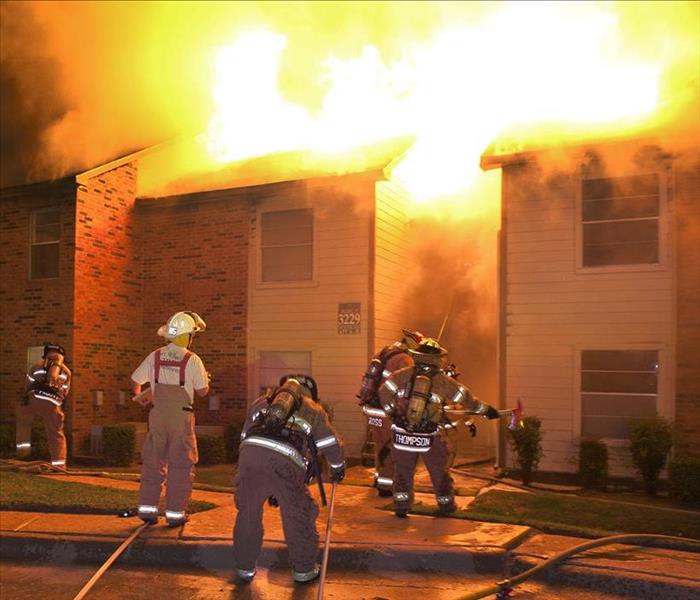Archived Fire Damage Blog Posts
Carbon Monoxide Detectors Save Lives
9/26/2023 (Permalink)
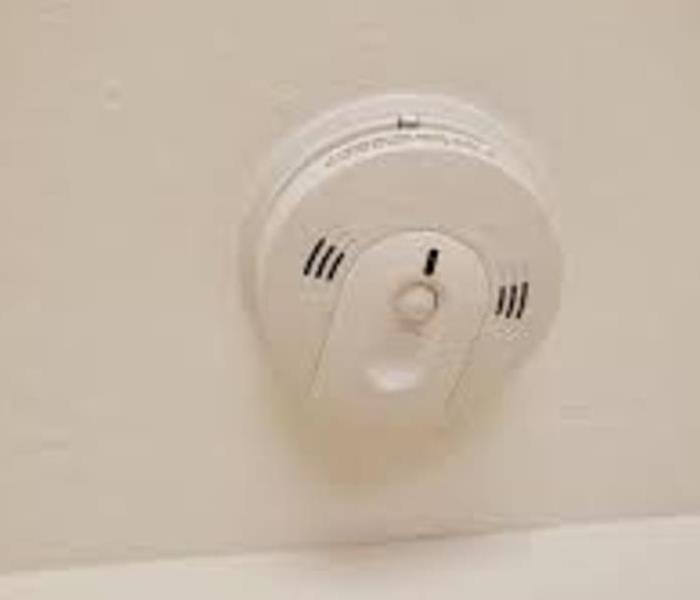 Be sure to install and maintain carbon monoxide detectors
Be sure to install and maintain carbon monoxide detectors
Carbon monoxide is known as the 'silent killer”. It puts your health at risk and can also pose a fire risk causing significant damage to your home.
SERVPRO® provides fire damage cleaning services and reconstruction that can remove soot, and smoke odors from your property. Our highly trained technicians respond to an emergency within a few hours.
Carbon monoxide is a type of gas produced when fuel such as wood, gas, oil, kerosene, and charcoal burns. If you don't have the appropriate ventilation or correct fuel, the carbon monoxide can get trapped in your home and build up overtime.
There are several sources of carbon monoxide you need to be aware of to help you avoid any health or fire hazards: fireplaces, chimneys, grills etc.
Because it is an invisible, odorless gas, it is undetectable without a carbon monoxide detector. Here are the signs of carbon monoxide present in your home:
Soot stains on or around gas appliances
Pilot lights that go out often
Increased condensation
Rust or soot staining in a chimney
What are the risks of carbon monoxide?
Carbon monoxide is seriously harmful to your health, and can lead to death if not addressed quickly.
Symptoms of carbon monoxide poisoning include:
headache
dizziness, feeling or
being sick
feeling weak
confusion
chest and muscle pain
shortness of breath
Install and maintain carbon monoxide detectors. Should a fire affect your home or business, call SERVPRO of Fernandina Beach/Jacksonville Northeast for your restoration and reconstruction needs.
Kitchen Fire in Jacksonville Home
3/31/2022 (Permalink)
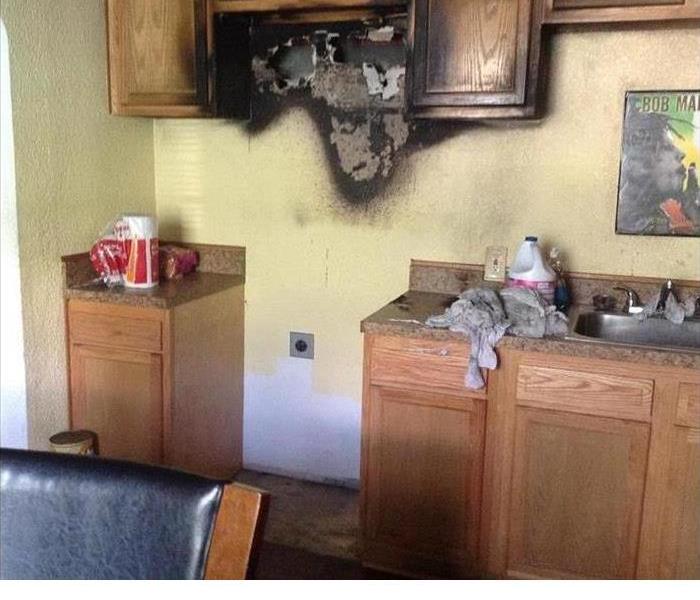 Cooking and cooking equipment is the leading cause of home fires and home fire injuries.
Cooking and cooking equipment is the leading cause of home fires and home fire injuries.
A Jacksonville homeowner was cooking with oil when he started a grease fire in the kitchen. Cooking and cooking equipment is the leading cause of home fires and home fire injuries. SERVPRO of Fernandina Beach/Jacksonville Northeast was called in to do the restoration after the fire.
Smoke and soot is very invasive and can penetrate various cavities within your home, causing hidden damage and odor. That was the case with this job; soot traveled behind the cabinets through the wall cavity, causing odor throughout the home. SERVPRO of Fernandina Beach/Jacksonville Northeast had to remove cabinets to get to the soot. Our smoke damage expertise and experience allows us to inspect and accurately assess the extent of the damage to develop a comprehensive plan of action. Here demolition was necessary to get rid of the pervasive odor caused by soot in wall cavities. The vinyl floor also had to be removed because the homeowner had dropped the burning skillet and oil onto the floor—literally melting the material.
Another factor in the overall damage involved the air handler. The A/C picked up the smoke and soot and blew it throughout the house. Ductwork had to be cleaned in all of the rooms, as well as the air handler and contents.
Our Restore vs. Replace Philosophy
In this case, some demolition was required but when we can we restore rather than replace. Why? Because restoring the affected areas of your property is substantially less costly than demolishing and replacing those areas. This “restore first” mentality also allows us to get your home or business back to pre-fire condition quicker and with less disruption.
If you suffer a home or business fire, call SERVPRO of Fernandina Beach/Jacksonville Northeast at 904-729-2401. We’ll handle your property with care, and get you back to normal.
Enjoying Candles Safely in Jacksonville Over the Holidays!
12/8/2021 (Permalink)
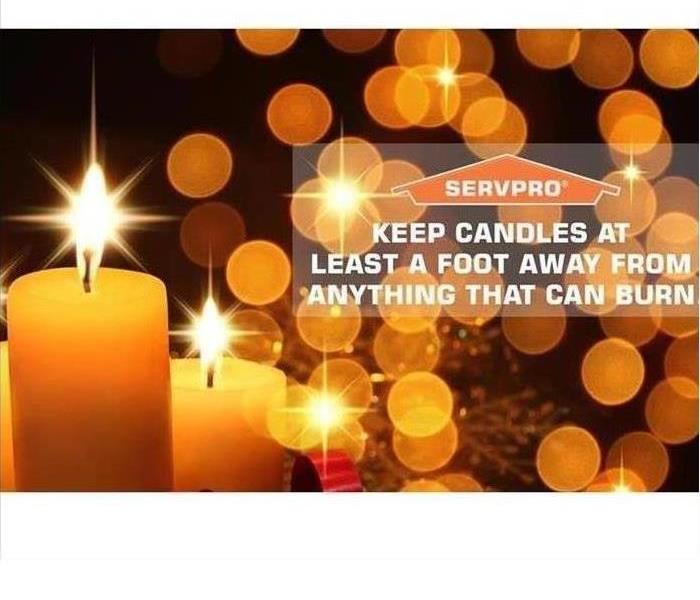 We wish you and your family a safe and happy holiday season!
We wish you and your family a safe and happy holiday season!
The National Candle Association and the National Association of State Fire Marshals are urging consumers to take special care when using candles this holiday season, and to follow these important fire-safety rules:
- Always keep a burning candle within your sight. Never leave a burning candle unattended.
- Keep burning candles away from combustible items. Be especially careful not to place candles near flammable decorations or Christmas greenery.
- Always use a candleholder specifically designed for candle use. The holder should be sturdy, heat resistant and big enough to collect dripping wax.
- Keep candles out of the reach of children and pets.
- Trim candlewicks to 1⁄4 inch before lighting or re-lighting. Keep the wax-pool free of wick trimmings, dust, matches and debris at all times.
- Never move a candle when it is burning.
We at SERVPRO of Fernandina Beach/Jacksonville Northeast wish you and your family a safe and Merry Christmas!
FAQ's about Smoke and Carbon Monoxide (CO) Alarms
12/1/2021 (Permalink)
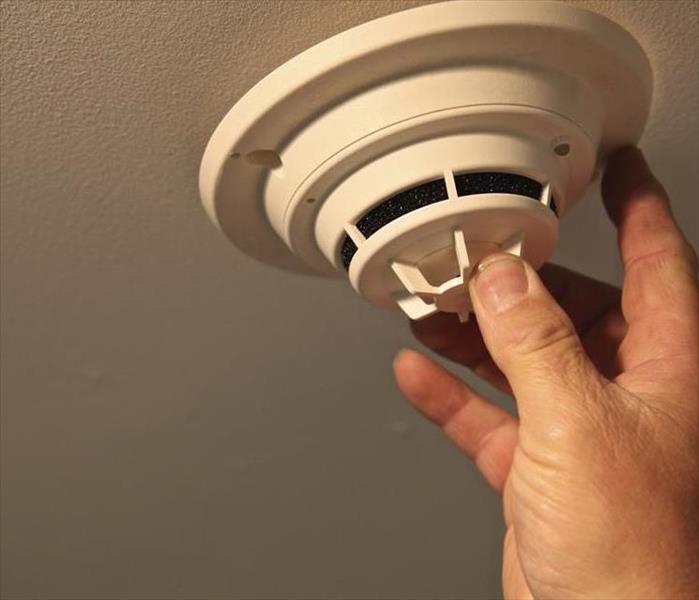 Smoke alarms sense smoke well before you can.
Smoke alarms sense smoke well before you can.
What’s the difference between smoke alarms and carbon monoxide (CO) alarms? Why do I need both?
Smoke alarms sense smoke well before you can, alerting you to danger. In the event of fire, you may have as little as two minutes to escape safely, which is why smoke alarms need to be in every bedroom, outside of the sleeping areas (like a hallway), and on each level (including the basement). Do not put smoke alarms in your kitchen or bathrooms.
Carbon monoxide is an odorless, colorless gas that displaces oxygen in your body and brain and can render you unconscious before you even realize something is happening to you. Without vital oxygen, you are at risk of death from carbon monoxide poisoning in a short time. CO alarms detect the presence of carbon monoxide and alert you so you can get out, call 9-1-1, and let the professionals check your home.
How do I know which smoke and CO alarm to choose for my home?
Choose an alarm that is listed with a testing laboratory, meaning it has met certain standards for protection. Whether you select a unit that requires yearly changing of batteries, or a 10-year unit that you change out at the end of the 10 years, either will provide protection.
CO alarms also have a battery backup. Choose one that is listed with a testing laboratory. For the best protection, use combination smoke and carbon monoxide alarms that are interconnected throughout the home. These can be installed by a qualified electrician, so that when one sounds, they all sound. This ensures you can hear the alarm no matter where in your home the alarm originates.
In the event you suffer fire or smoke damage, contact SERVPRO of Fernandina Beach/Jacksonville Northeast at 904.729.2401.
Safe Cooking for Your Holiday Get-Togethers
11/23/2021 (Permalink)
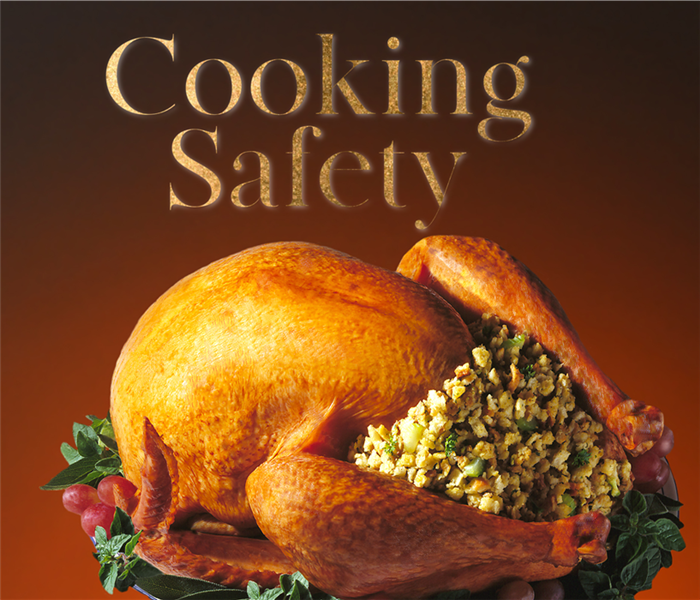 We at SERVPRO Fernandina Beach/Jacksonville NE hope you enjoy the Thanksgiving holiday!
We at SERVPRO Fernandina Beach/Jacksonville NE hope you enjoy the Thanksgiving holiday!
Source: National Fire Protection Association (NFPA)
Thanksgiving is the peak day for home cooking fires. Following these tips will help make sure you stay safe from fires on Thanksgiving Day.
- Stay in the kitchen when you are cooking on the stovetop so you can keep an eye on the food.
- Stay in the home when cooking your turkey and check on it frequently.
- Keep children away from the stove. The stove will be hot and kids should stay 3 feet away.
- Make sure kids stay away from hot food and liquids. The steam or splash from vegetables, gravy or coffee could cause serious burns.
- Keep the floor clear so you don’t trip over kids, toys, pocketbooks or bags.
- Keep knives out of the reach of children.
- Keep matches and utility lighters out of the reach of children — up high in a locked cabinet.
- Never leave children alone in room with a lit candle.
- Make sure your smoke alarms are working. Test them by pushing the test button.
If you do have an issue with fire or smoke over the holiday, call the fire restoration experts at SERVPRO Fernandina Beach/Jacksonville Northeast at 904.729.2401.
Fire Prevention Month: Smoke Alarm Safety
10/21/2021 (Permalink)
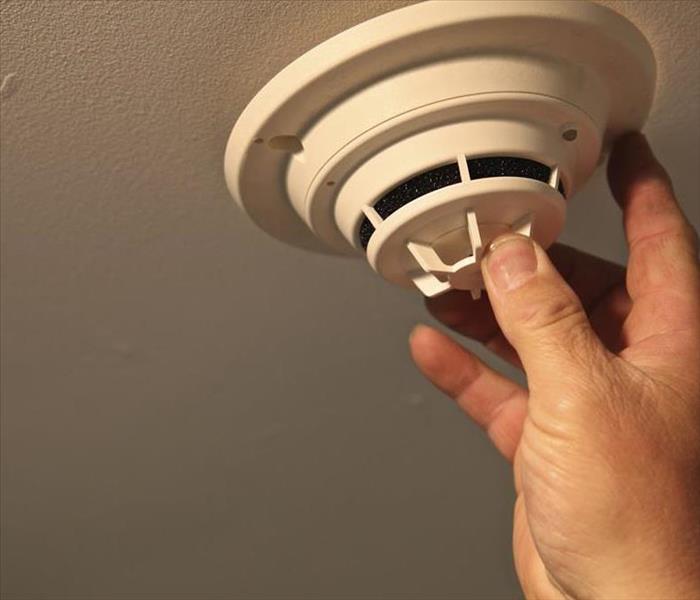 3 out of 5 fire deaths occur in homes with no smoke alarms or no working smoke alarms.
3 out of 5 fire deaths occur in homes with no smoke alarms or no working smoke alarms.
Source: National Fire Protection Association
In keeping with fire prevention month, here are some things you should know about smoke alarms. The first thing you need to know is that 3 out of 5 fire deaths occur in homes with no smoke alarms or no working smoke alarms.
Smoke alarms are a key part of a home fire escape plan. When there is a fire, smoke spreads fast. Working smoke alarms give you early warning so you can get outside quickly.
SAFETY TIPS
- Install smoke alarms in every bedroom. They should also be outside each sleeping area and on every level of the home. Install alarms in the basement.
- Large homes may need extra smoke alarms.
- It is best to use interconnected smoke alarms. When one smoke alarm sounds, they all sound.
- Test all smoke alarms at least once a month.
Press the test button to be sure the alarm is working. - Current alarms on the market employ different types of technology including multi-sensing, which could include smoke and carbon monoxide combined.
- Today’s smoke alarms will be more technologically advanced to respond to a multitude of fire conditions, yet mitigate false alarms.
- A smoke alarm should be on the ceiling or high on a wall. Keep smoke alarms away from the kitchen to reduce false alarms. They should be at least 10 feet (3 meters) from the stove.
- People who are hard-of-hearing or deaf can use special alarms. These alarms have strobe lights and bed shakers.
- Replace all smoke alarms when they are 10 years old.
If you do have fire damage at your home or place of business, call SERVPRO of Fernandina Beach/Jacksonville Northeast at 94.729.2401.
How To Make a Fire Escape Plan
10/1/2021 (Permalink)
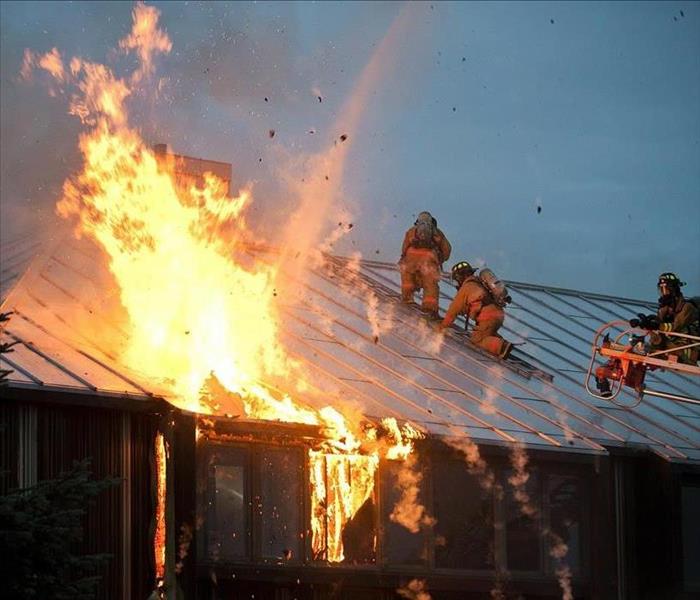 Having a home fire escape plan will reduce the chance of fire-related injuries.
Having a home fire escape plan will reduce the chance of fire-related injuries.
Source: National Fire Protection Association
Since October is Fire Prevention Month, we thought it would be a good time to discuss fire escape plans.
On average, there are 358,000 home fires each year in the U.S. with 12,300 injuries. Having a home fire escape plan will reduce the chance of fire-related injuries. Follow these steps to create yours.
- Draw a map of your home. Show all doors and windows.
- Mark all of the smoke alarms with “SA”. Smoke alarms should be in each sleeping room, outside each sleeping area, and on every level of the home.
- Visit each room. Find two ways out.
- All windows and doors should open easily. You should be able to use them to get outside.
- Make sure your home has smoke alarms. Push the test button to make sure each alarm is working.
- Pick a meeting place outside. It should be in front of your home. Everyone will meet at the meeting place.
- Make sure your house or building number can be seen from the street.
- Talk about your plan with everyone in your home.
- Learn the emergency phone number for your fire department.
- Practice your home fire drill!
If you suffer smoke or fire damage to your home, SERVPRO of Fernandina Beach/Jacksonville Northeast can help. Call us at 904.729.2401.
Precautions for Fire Safety
9/9/2021 (Permalink)
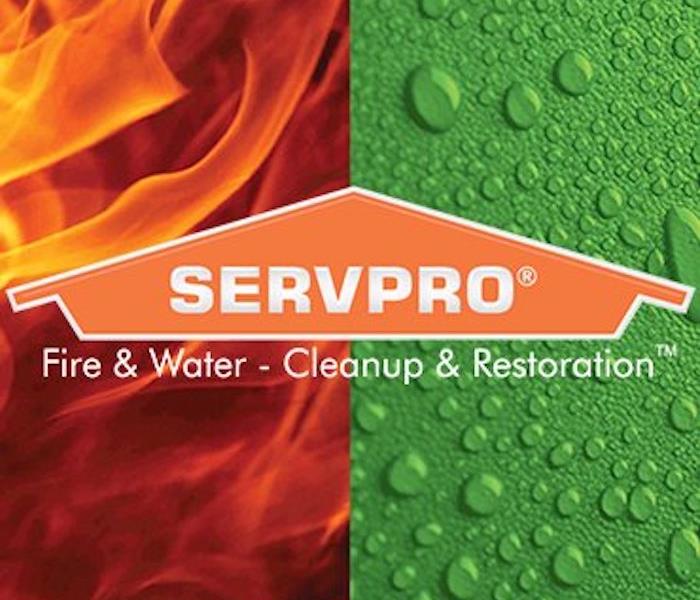 If you have fire damage, call SERVPRO of Fernandina Beach/Jacksonville Northeast at 904.729.2401. We're Here to Help!
If you have fire damage, call SERVPRO of Fernandina Beach/Jacksonville Northeast at 904.729.2401. We're Here to Help!
According to the National Fire Protection Association, in the U.S., we have an average of 353,100 house fires a year. A house fire can be one of the most damaging, and difficult situations to recover from. It not only carries the physical implications of a damaged building structure but also the emotional strain of losing cherished belongings. For us at SERVPRO of Fernandina Beach/Jacksonville Northeast, restoring hope is just as important as restoring your property. If we can help it, we would rather that you don’t experience these losses altogether. Here are some tips to prevent the top causes of a house fire.
Smoking
Smoking is the number one cause of home fire deaths in the U.S. If you smoke, it is best to do so outside. A cigarette should be completely put out before going to bed, and never smoke in bed. And always keep smoking materials away from kids.
Electrical fire
The leading causes of electrical fires in a home are old appliances and faulty electrical outlets. Regularly inspect the electrical cords from your appliances, and never alter the prongs on a plug. Avoid having electrical cords ran underneath a carpet and when you are unplugging a cord, be sure to hold the plug securely and not the cord. Unplugging a cord from a wall by pulling the cord can cause it to fray and possibly lead to a fire.
Cooking
Cooking fires are the leading types of home fires in the U.S.. Most often these fires are caused by unattended cooking. Be sure to never leave food while the source of heat is still active. Be aware of combustible material, and keep it away from anything cooking. Double-check ovens and stovetops once cooking is done to ensure they are turned off.
If you have experienced fire damage, please don’t hesitate to contact us at 904.729.2401. We have the experience and expertise to restore your property and belongings.
Fire Extinguisher FAQs
8/18/2021 (Permalink)
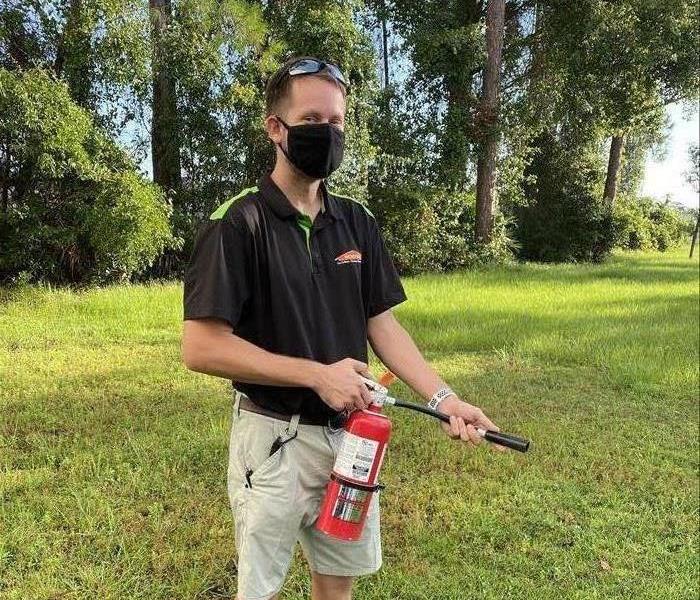 Josh Hortman demonstrates proper use of a fire extinguisher.
Josh Hortman demonstrates proper use of a fire extinguisher.
Having an in-date fire extinguisher on your property is important to fire safety, but did you know that there are different kinds of fire extinguishers, as well as a proper way in which to use one? Keeping yourself, your family, and your property protected in the event of a structure fire is paramount, and the following information can help facilitate that process.
Q: What are the different kinds of fire extinguishers, and what is each used for?
A: The U.S. Fire Administration defines five primary types of fire extinguishers used to put out different kinds of fires:
- A – used for ordinary material fires, such as wood, cloth, or paper.
- B – for use with combustible or flammable liquids like grease, gasoline, or oil.
- C – for use with electrical equipment like appliances and tools.
- D – for use with flammable metals.
- K – for use with animal oils, vegetable oils, and fats in cooking appliances.
Many fire extinguishers may also be multipurpose, in that they carry multiple letter definitions and can put out a variety of material fires.
Q: What is the proper way to use a fire extinguisher?
A: The U.S. Fire Administration suggests the acronym “PASS” as a means of properly discharging a fire extinguisher:
P - Pull the pin. Hold the extinguisher with the nozzle pointing away from you and release the locking mechanism.
A - Aim low. Point the extinguisher at the base of the fire.
S - Squeeze the lever slowly and evenly
S - Sweep the nozzle from side to side
To keep yourself safe, it is important to use extreme caution within a fire damaged structure. SERVPRO of Fernandina Beach/Jacksonville Northeast offers a full line of fire clean up and restoration services, and we are Here to Help when you need us. Give us a call at 904-729-2401 to learn more.
5 Tips to Prevent Summer Fires
7/1/2021 (Permalink)
 Fireworks account for some 50,000 fires per year.
Fireworks account for some 50,000 fires per year.
Summer activities can lead to a higher potential for fires in your home, but there are some actions you can take to prevent it. Here are five tips to prevent summer fires.
Fires Started by grills
It is almost ingrained in our culture that as the weather heats up, so do our backyard grills! As much as grilling is a favorite pastime for many, the need for grill safety is evident.
According to the NFPA, 29% of gas-fueled grill fires happen from a failure to clean. This is the largest contributor to grill fires. Be sure to clean your grills and grease trap after each use. Other reasons for grill fires to be aware of include heat sources being too close to combustibles, and mishandled propane.
Fires started by air conditioners
The heat in North Florida causes a need for high air conditioning use. Central air systems are not as likely to start fires as portable or fixed units. Generally, wall units and portable units have a higher requirement for electric power, and the wiring at times may not keep up.
The first measure of safety with air conditioning units is to always have a professional install your unit. Be sure to have your unit serviced annually, and do not use an extension cord with your air conditioning unit. These actions will greatly reduce the chance of a fire, and the need for fire damage restoration!
Fires started by smoking
There are nearly 1,000 fire deaths every year caused by cigarettes. If you smoke, one of the best options to prevent a home fire is to smoke outside. One of the larger fire dangers cigarettes carry is the ability to spark a wildfire. Even though there has been a decline since the 1980’s in wildfires started by cigarettes, our dry and dense forests provide a high risk for even a small spark to start a fire. Be sure to extinguish your cigarettes, and never dispose of them by throwing them out of your window.
Fires started by Fireworks
The beauty and excitement of fireworks may be something that you look forward to each year, but along with the fun times and celebration comes a responsibility of safety. Every year over 50,000 fires are caused by fireworks. Much of the fire damage restoration that is called for every summer can be attributed to the improper use of fireworks. Some of the precautions include keeping a bucket of water nearby, never letting young children handle fireworks, and soaking fireworks for a few hours before discarding them. Check out nsc.org for more fireworks safety tips.
Wildfires
It may be surprising for some to find that the vast majority of wildfires are caused by humans. We can help lower the number of wildfires if we all were more aware of and took the safety measures necessary to keep our forests safe. Campfires and equipment malfunction are some of the main causes of wildfires started by humans.
- Campfires: Be sure to drown the fire, stir the embers to get them all wet, and feel the area with the back of your hand to make sure nothing is still smoldering.
- Equipment malfunction: Whenever using equipment or machinery, be sure to follow its proper use, and read the instruction manual before operating.
We at SERVPRO of Fernandina Beach/Jacksonville NE wish you a Happy July 4th, and urge you to practice fire safety!
Heating Safety in North Florida
1/14/2021 (Permalink)
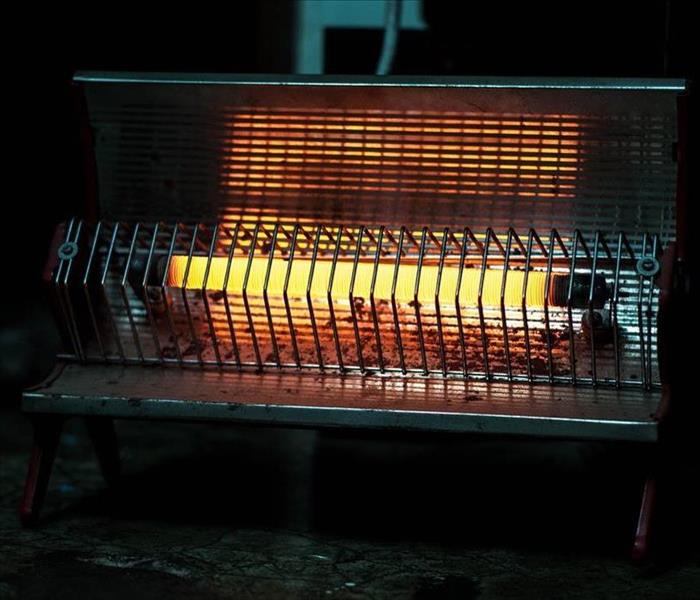 Nearly 75% of deaths caused by home heating equipment involved portable space heaters.
Nearly 75% of deaths caused by home heating equipment involved portable space heaters.
Heating equipment is the leading cause of home fires during the winter months, and the second leading cause of home fires annually. Heating equipment includes fireplaces, wood stoves, portable space heaters, and fixed space heaters. Nearly three-quarters of all deaths attributed to home heating equipment fires involve portable space heaters.
Space Heaters
Be careful with space heaters.
According to the U.S. Fire Administration, space heaters are involved in 74 percent of fire-related deaths. The best way to prevent a home fire caused by a space heater is to purchase one with an emergency cut-off so that it will automatically shut off if tipped over or accidentally knocked down. Otherwise, if it falls on the carpeting and does not turn off, it could easily ignite a fire.
Never leave space heaters unattended. And make sure you place your heater on a flat, level, non-flammable surface such as ceramic tile rather than on a carpet. Do not place space heaters near curtains, bedding or anything flammable, and make sure you are plugging the space heater into a GFI (Ground Fault Interrupter) system, so that if a malfunction does occur, the electricity will automatically turn off.
Also,
- Maintain a 36 inch clearance between space heaters and combustible items
- Turn off portable space heaters every time you leave the room or go to sleep
These tips from SERVPRO of Fernandina Beach/Jacksonville Northeast will help to keep you safe from heating fires this winter. Call us at 904.729.2401 if we can be of service.
Grease Fire in Jacksonville Home
12/3/2020 (Permalink)
 This oven showed significant damage as the result of the grease fire.
This oven showed significant damage as the result of the grease fire.
The damage shown to this oven is the result of a grease fire, which are a common cause of home fires and related damage.
Steps to put out a grease fire:
- Turn off source of heat (burner / element).
- Do NOT pour water on it.
- Attempt to remove all oxygen from the flame. You can cover with another pot, or baking pan.
- If you can't cover it, dump baking soda (lots of it) on it.
Keep a lid nearby when you’re cooking to smother small grease fires. Smother the fire by sliding the lid over the pan and turn off the stovetop. Leave the pan covered until it is completely cooled.
If you suffer a fire or smoke damage, please call SERVPRO of Fernandina Beach/Jacksonville Northeast at 904-729-2401—even over the holiday. Refer to our Fire Damage Tips—Until Help Arrives Guide and follow these tips to protect yourself and y
Fire Safety Tip: Change the Dryer Lint Filter Before Each Use
11/18/2020 (Permalink)
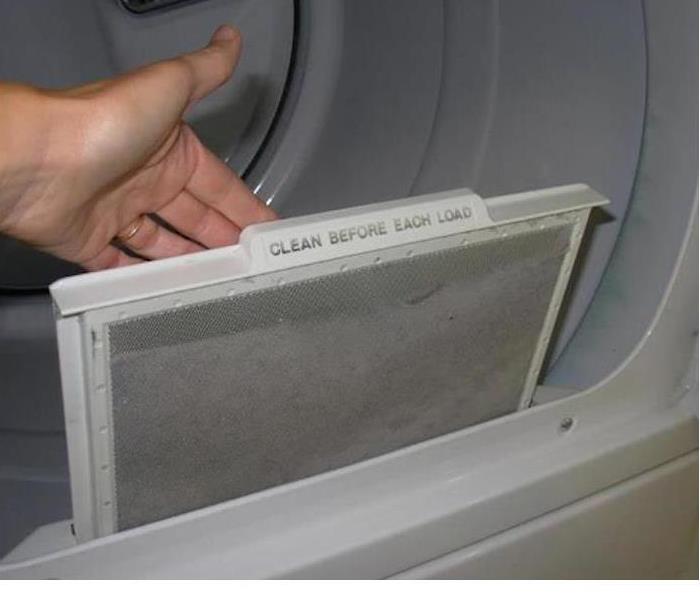 It is important to clean the lint filter before and after each load.
It is important to clean the lint filter before and after each load.
According to FEMA, failure to clean home dryers causes 34% of home dryer fires. Home dryer fires cause $35 million in property loss and can even cause injury or death.
To reduce the risk of these fires happening in your home, SERVPRO of Fernandina Beach/Jacksonville Northeast can help clean vents and ducts that may have lint build-up.
Other tips for keeping your dryer vents clean from the National Fire Protection Association (NFPA) include cleaning the lint filter before and after each load and making sure the outdoor vent flap will open and is not restricted by obstacles. Do not use a dryer that does not have a lint filter.
Your first hint that you need to check your vents is when your clothing doesn’t dry after a normal drying cycle.
Other hints include a musty odor in the clothing following the drying cycle, clothes that seem unusually hot to the touch, or excessive heat in the laundry room.
If you would like your dryer vent cleaned to minimize risk of fires--or you have sustained smoke or file damage from a dryer fire--call SERVPRO of Fernandina Beach/Jacksonville Northeast at 904.729.2401.
Cooking Fire in Jacksonville Home
10/21/2020 (Permalink)
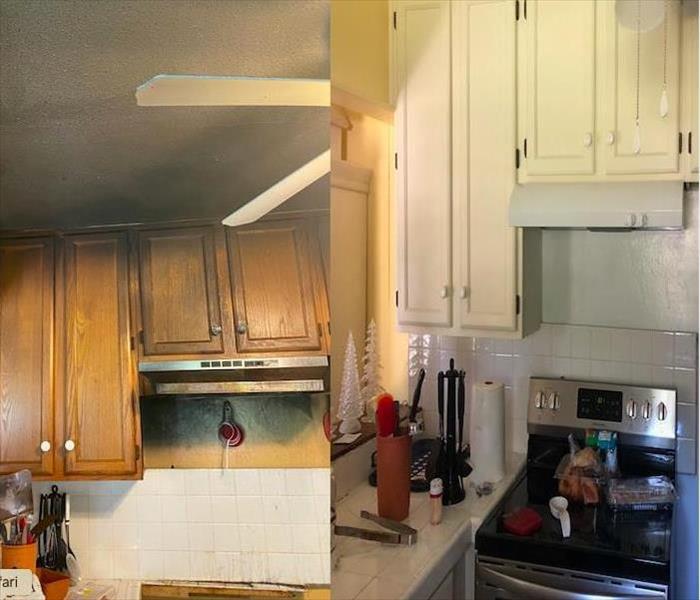 SERVPRO of Fernandina Beach/Jacksonville Northeast restored the smoke and fire damage in this kitchen, making it look like new!
SERVPRO of Fernandina Beach/Jacksonville Northeast restored the smoke and fire damage in this kitchen, making it look like new!
The accompanying before and after photos show smoke and fire damage from a cooking fire in a Jacksonville home and the subsequent restoration. SERVPRO of Fernandina Beach/Jacksonville Northeast was called in to restore the damage, which was caused when the homeowner, an elderly woman, left the kitchen to check on her spouse.
According to the National Fire Protection Association (NFPA), cooking fires are the number one cause of home fires and home injuries. The leading cause of fires in the kitchen is unattended cooking.
What you should know about home cooking safety
- Be on alert! If you are sleepy or have consumed alcohol, don’t use the stove or stovetop.
- Stay in the kitchen while you are frying, grilling, boiling, or broiling food.
- If you are simmering, baking, or roasting food, check it regularly, remain in the kitchen while food is cooking, and use a timer to remind you that you are cooking.
- Keep anything that can catch fire — oven mitts, wooden utensils, food packaging, towels or curtains — away from your stovetop.
- If you have a cooking fire, just get out! When you leave, close the door behind you to help contain the fire.
- Call 9-1-1 or the local emergency number after you leave.
- If you try to fight the fire, be sure others are getting out and you have a clear way out.
- Keep a lid nearby when you’re cooking to smother small grease fires. Smother the fire by sliding the lid over the pan and turn off the stovetop. Leave the pan covered until it is completely cooled.
- For an oven fire, turn off the heat and keep the door closed.
Practice these tips to avoid cooking fires in your home. If you do, however, have smoke or fire damage, call SERVPRO of Fernandina Beach/Jacksonville Northeast at 904.729.2401.
October is Fire Prevention Month
10/13/2020 (Permalink)
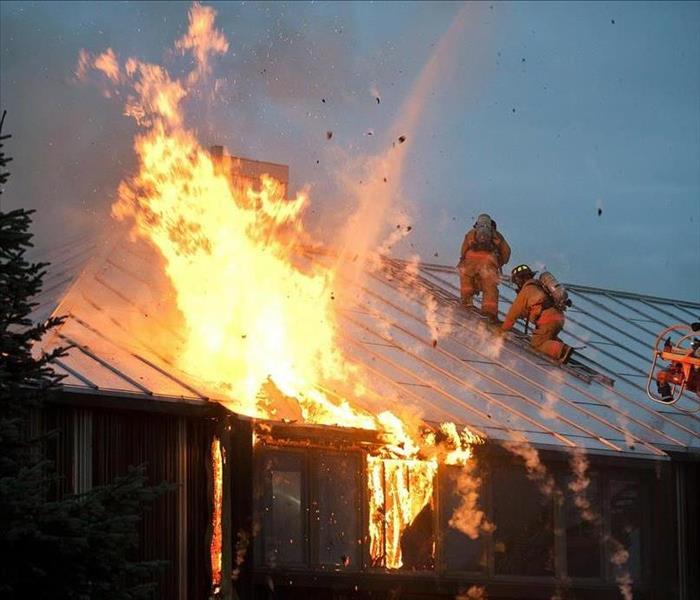 If you suffer fire-related damage, please call SERVPRO Fernandina Beach/Jacksonville Northeast at 904.729.2401.
If you suffer fire-related damage, please call SERVPRO Fernandina Beach/Jacksonville Northeast at 904.729.2401.
Fire Prevention month an ideal time to talk with your whole family about fire safety – including testing alarms, changing the batteries or upgrading to 10-year sealed battery alarms, how to use a fire extinguisher and escape route planning.
Did You Know?
- 3 of every 5 home fire deaths resulted from fires in homes with no working smoke alarms
- Less than 50% of homeowners have an escape plan
- Carbon monoxide (CO) is the #1 cause of accidental death
- 60% of consumers do not test their smoke and CO alarms monthly*
- Only 47% of people report having CO alarms in their home
- Just 43% of homeowners have an escape plan*
- Unattended cooking is the #1 cause of home fires
Are You Ready at Home?
Take time this month to address these topics with your family and make the needed safety plans.
If you do suffer fire-related damage, please call SERVPRO Fernandina Beach/Jacksonville Northeast at 904.729.2401. We’ll get there fast and restore your home back to normal.
Kitchen Fire at St. Mary's Home Leaves Substantial Damage
8/27/2020 (Permalink)
 Many fires start when cooking food is left unattended on the stovetop.
Many fires start when cooking food is left unattended on the stovetop.
The accompanying photograph shows some of the damage that occurred as a result of a kitchen fire at a St. Marys home. The fire was caused when a person cooking left food unattended on the stove.
A fire can leave behind soot, smoke damage, and a host of other problems. Ceilings, walls, woodwork, carpeting, and floors will often need a thorough professional cleaning. If your home or business suffers a fire, it is important to take the appropriate steps to prevent further damage until SERVPRO of Fernandina Beach/Jacksonville Northeast professionals arrive. The following tips may help reduce damage and increase chances of a successful restoration.
What To Do After A Fire
- Limit movement in the home to prevent soot particles from being embedded into upholstery and carpets.
- Keep hands clean so as not to further soil upholstery, walls and woodwork.
- Place clean towels or old linens on rugs, upholstery and carpet traffic areas.
- If electricity is off, empty freezer and refrigerator and prop doors open.
- Clean and protect chrome with light coating of petroleum jelly or oil.
- Wash houseplants on both sides of leaves.
- Change HVAC filter.
- Tape double layers of cheesecloth over air registers.
What NOT To Do After A Fire
- Don't attempt to wash any walls or painted surfaces or shampoo carpet or upholstery without contacting us.
- Don't attempt to clean any electrical appliances that may have been close to fire, heat or water without consulting an authorized repair service.
- Don't use any canned or packaged food or beverages that may have been stored near the fire, heat or water.
- Don't turn on ceiling fixtures if ceiling is wet. The wiring may be damaged.
- Don't send garments to an ordinary dry cleaner. Improper cleaning may set smoke odor.
If you have fire damage, call SERVPRO of Fernandina Beach/Jacksonville Northeast at 904.729.2401 as soon as possible.
A Note About Fire Damage Restoration
8/5/2020 (Permalink)
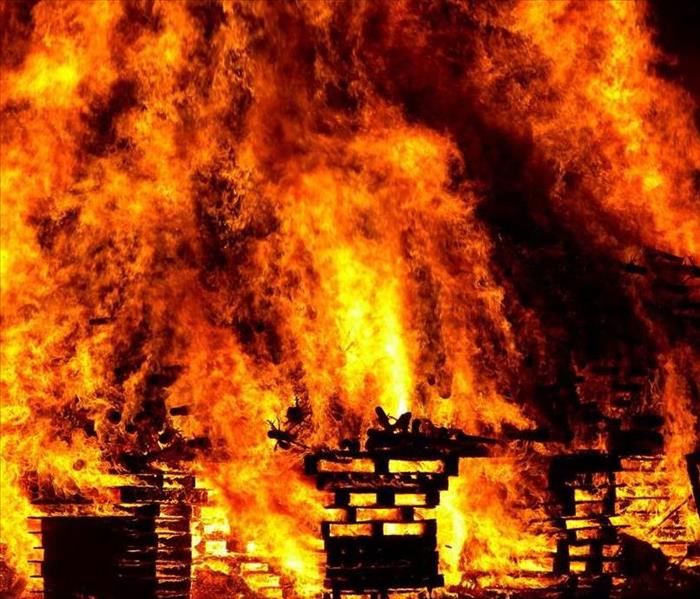 Call SERVPRO at 904.729.2401 of Fernandina Beach/Jacksonville NE if you have smoke or fire damage.
Call SERVPRO at 904.729.2401 of Fernandina Beach/Jacksonville NE if you have smoke or fire damage.
Fire damage restoration involves removing smoke residues and deodorizing smoke odors. Fire damages present a great variety of cleaning challenges due to the many ways that heat, oxygen, moisture, and gases interact to form smoke residues. The different types of burning materials found in buildings and the effects smoke and heat have on materials create other variables for cleaning methods. All of these variables make it difficult to establish fixed, defined procedures for cleaning fire damages, but the primary steps are outlined below.
Emergency Contact
When you call us, our representative will ask questions regarding the fire damage event that enables us to respond immediately with the appropriate equipment and resources.
Inspection and Fire Damage Assessment
We carefully inspect and test adjoining rooms of your property to determine the extent of the fire, smoke, and soot damage.
Immediate Board-Up and Roof-Tarp Service
Fire damage can often compromise windows, walls, and roofs. To maintain security and to protect against further damage, we can board up missing windows and walls and place tarps on damaged roofs.
Water Removal and Drying (if water damage is present from fire-fighting efforts)
The water removal process begins almost immediately and removes the majority of the water. We then use dehumidifiers and air movers to remove the remaining water and complete the drying process.
Removal of Smoke and Soot from All Surfaces
We use specialized equipment and techniques to remove smoke and soot from ceilings, walls, and other surfaces.
Cleaning and Sanitizing
We clean, sanitize, and disinfect all of the restorable items and structures that were impacted. We use a variety of cleaning techniques, and we’re also trained to remove odors using industrial air scrubbers and fogging equipment.
Restoration
Restoration may involve minor repairs, such as replacing drywall, painting, and installing new carpet; or it may entail major repairs such as the reconstruction of various areas or rooms in a home or business—whatever it takes to return the property to preloss condition.
As you will note, fire restoration is very labor intensive as the structure and all contents must be considered and cleaned. You can be assured, however, that SERVPRO Fernandina Beach/Jacksonville Northeast has the experience and equipment to provide you with an outstanding restoration. Call us at 904.729.2401 if you suffer smoke or fire damage.
Practicing Safety with Fireworks
7/1/2020 (Permalink)
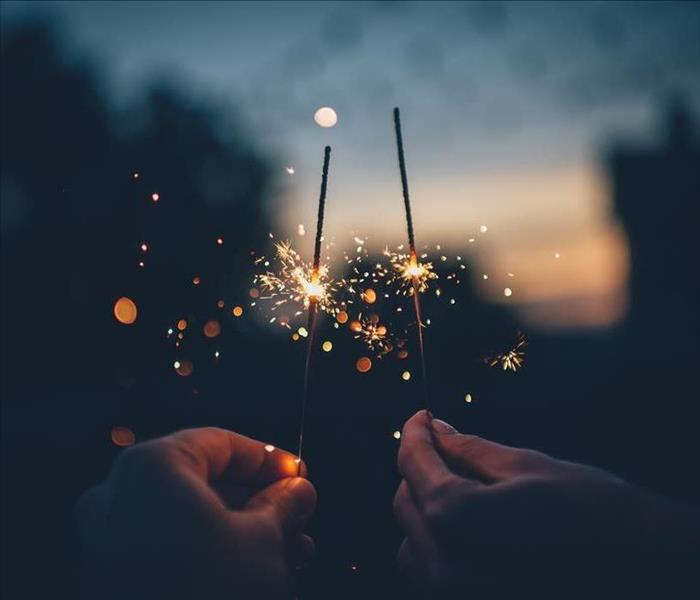 Sparklers seems safe enough, but they burn at 2000 degrees Fahrenheit, so use caution!
Sparklers seems safe enough, but they burn at 2000 degrees Fahrenheit, so use caution!
Source: National Safety Council
When you think of July 4th, most people think of fireworks. The National Safety Council advises everyone to enjoy fireworks at public displays conducted by professionals, and not to use any fireworks at home due to safety reasons. However, with many local municipalities discouraging large crowds and canceling fireworks due to COVID-19, more people may be using fireworks at home.
In 2017, eight people died and over 12,000 were injured badly enough to require medical treatment after fireworks-related incidents. Of these, 50% of the injuries were to children and young adults under age 20. Over two-thirds (67%) of injuries took place from June 16 to July 16. And while the majority of these incidents were due to amateurs attempting to use professional-grade, homemade or other illegal fireworks or explosives, an estimated 1,200 injuries were from less powerful devices like small firecrackers and sparklers.
If You Choose to Use Legal Fireworks
If consumer fireworks are legal to buy where you live and you choose to use them, be sure to follow the following safety tips:
- Never allow young children to handle fireworks
- Older children should use them only under close adult supervision
- Never use fireworks while impaired by drugs or alcohol
- Anyone using fireworks or standing nearby should wear protective eyewear
- Never hold lighted fireworks in your hands
- Never light them indoors
- Only use them away from people, houses and flammable material
- Never point or throw fireworks at another person
- Only light one device at a time and maintain a safe distance after lighting
- Never ignite devices in a container
- Do not try to re-light or handle malfunctioning fireworks
- Soak both spent and unused fireworks in water for a few hours before discarding
- Keep a bucket of water nearby to fully extinguish fireworks that don't go off or in case of fire
- Never use illegal fireworks
Practice safety with fireworks, and remember we at SERVPRO Fernandina Beach/Jacksonville Northeast wish you a safe and happy holiday!
10 Safety Tips for Space Heaters
12/30/2019 (Permalink)
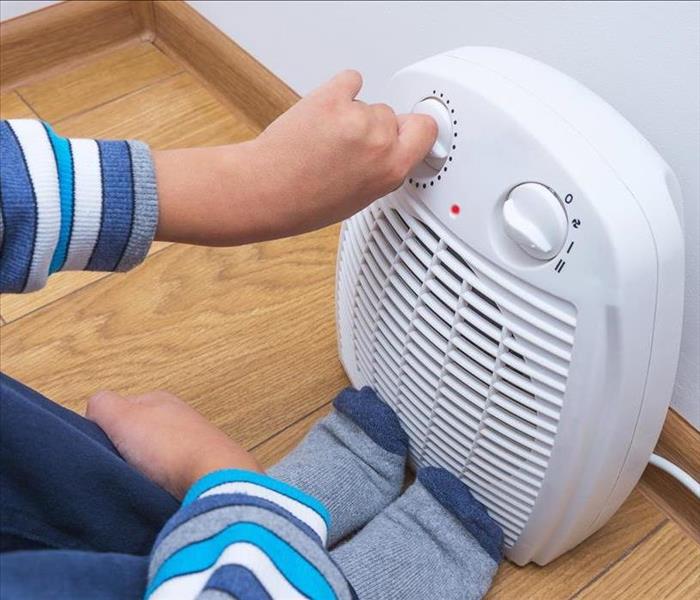 When staying warm, it's important to keep fire safety in mind when using space heaters.
When staying warm, it's important to keep fire safety in mind when using space heaters.
Thankfully, northeast Florida has a pretty mild winter, but we do have some cold weather. Often on our chilly Florida nights, it’s common for families to use space heaters to take the chill off. Space heaters can be a more affordable alternative to central heat when you don’t need to heat the whole house. They can also boost the temperature of rooms used by individuals who may be sensitive to cold, especially elderly persons, without sacrificing the comfort of other family members.
Safety is very important when using space heaters. The U.S. Consumer Product Safety Commission estimates that more than 25,000 residential fires yearly are associated with space heaters, resulting in more than 300 deaths. In addition, an estimated 6,000 people are treated in emergency rooms due to contact with the hot surfaces of room heaters, mostly in non-fire situations.
However, space heaters, especially older ones come with a fire risk. Here are eight tips to consider if you use space heaters in your North Jacksonville or Fernandina area home.
- Never plug your space heater into a surge protector. Plug it directly into a wall receptacle.
- Avoid using space heaters in wet areas such as bathrooms and kitchens.
- Be sure your space heater has a tip over feature that makes it turn off if knocked over. If not, consider replacing it.
- Monitor your pets closely around the space heater.
- Never leave space heaters unattended, especially around children.
- Do not operate a space heater while you are sleeping. Always turn them off and unplug them before going to bed.
- Avoid placing your heater in walkways where they are more apt to be knocked over.
- Keep your space heater away from curtains, blankets and other fabric materials. Keep anything that can heat at least 3 feet away from anything that can burn.
- If your space heater cords are tattered or it’s not working as expected, turn it off and have it checked by an electrician or consider replacing it.
- Be sure everyone in your home knows how to safely use your space heater.
Practicing good safety measures can drastically reduce the risk of a fire or injury in your home, but accidents can and do happen. If you ever need assistance with clean up after a fire in your home or business, our team at SERVPRO specializes in fire damage repair and restoration and can work with your insurance carrier to get things back to normal.
Fire Safety Tips For Your Nassau County/North Jax Live Christmas Tree
12/9/2019 (Permalink)
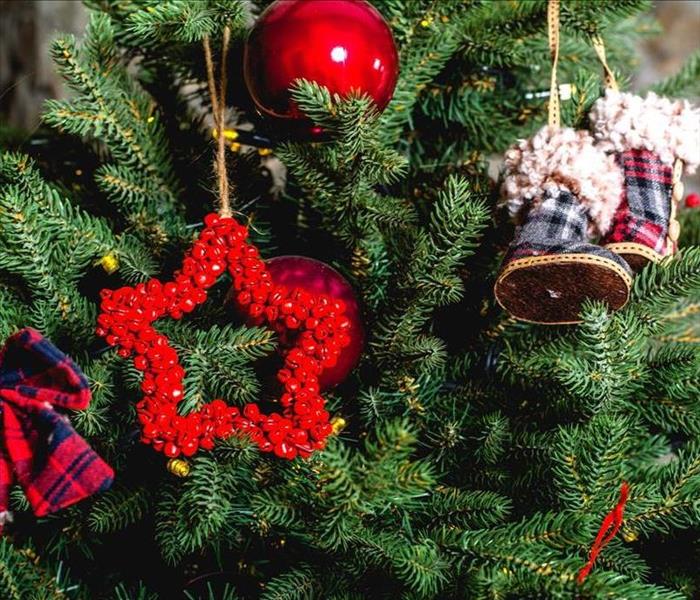 Live Christmas trees are special but it's important to follow these tips to prevent fires.
Live Christmas trees are special but it's important to follow these tips to prevent fires.
Source: American Christmas Tree Association
Did you know that Christmas tree-related fires alone result in 13 million dollars annually in property damage? More importantly, these fires present real risk towards family and friends. When showcasing a live tree in your home, the combination of tree dryness, electrical malfunction with lights and poorly located heating sources can make for a deadly combination.
BUT IF YOUR HOLIDAY IS JUST NOT COMPLETE WITHOUT A LIVE TREE, FOLLOW THESE SAFETY PRECAUTIONS TO KEEP THREATS AT BAY:
- Fresh trees are less likely to catch fire, so look for a tree with vibrant green needles that are hard to pluck and don’t break easily from its branches. The tree shouldn’t be shedding its needles readily.
- Always place your tree away from heat sources like fireplaces, radiators, candles, heat vents or lights, and keep the tree base filled with water to avoid a dry out.
- Make sure all your indoor and outdoor Christmas lights have been tested in a lab by the UL or ETL/ITSNA for safety, and throw out any damaged lights.
- Any lights you use outdoors must be labeled suitable for exterior placement, and be sure to plug them into a ground-fault circuit interrupter protected receptacle.
- Keep all your holiday candles away from your Christmas tree, surrounding furniture and décor.
- Bedtime means lights off! Don’t forget to turn your Christmas tree lights off each night.
SERVPRO of Fernandina Beach/Jacksonville Northeast wishes you a safe and happy holiday season!
How To Make A Home Fire Escape Plan
12/3/2019 (Permalink)
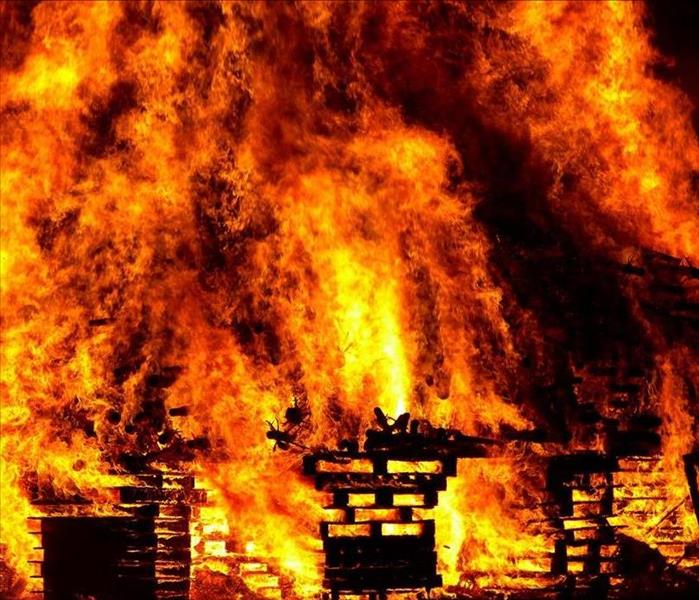 Having a home fire escape plan will reduce the chance of fire-related injuries.
Having a home fire escape plan will reduce the chance of fire-related injuries.
Source: National Fire Protection Association
On average, there are 358,000 home fires each year in the U.S. with 12,300 injuries. Having a home fire escape plan will reduce the chance of fire-related injuries. Follow these steps to create yours.
- Draw a map of your home. Show all doors and windows.
- Mark all of the smoke alarms with “SA”. Smoke alarms should be in each sleeping room, outside each sleeping area, and on every level of the home.
- Visit each room. Find two ways out.
- All windows and doors should open easily. You should be able to use them to get outside.
- Make sure your home has smoke alarms. Push the test button to make sure each alarm is working.
- Pick a meeting place outside. It should be in front of your home. Everyone will meet at the meeting place.
- Make sure your house or building number can be seen from the street.
- Talk about your plan with everyone in your home.
- Learn the emergency phone number for your fire department.
- Practice your home fire drill!
If you suffer smoke or fire damage to your home, SERVPRO of Fernandina Beach/Jacksonville Northeast can help. Call us at 904.729.2401.
A Note About Use of Turkey Fryers in Fernandina/North Jax
11/25/2019 (Permalink)
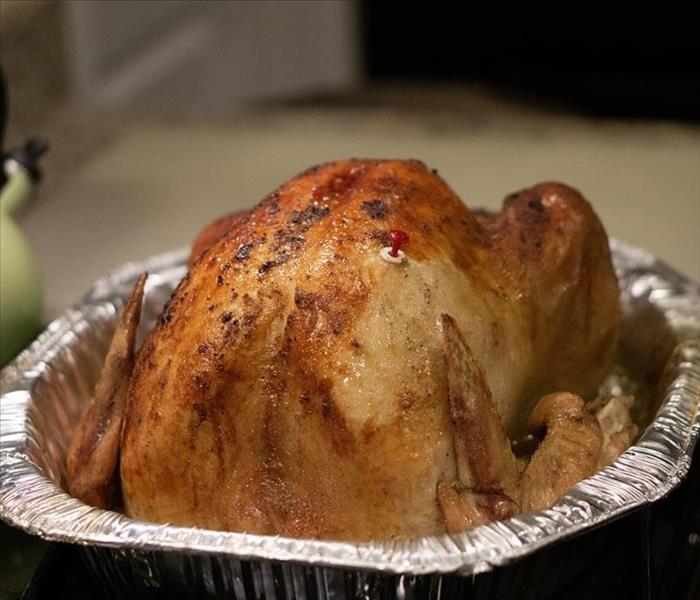 SERVPRO of Fernandina Beach/Jacksonville Northeast wishes you a safe and Happy Thanksgiving. If you plan to use a turkey fryer, please use caution!
SERVPRO of Fernandina Beach/Jacksonville Northeast wishes you a safe and Happy Thanksgiving. If you plan to use a turkey fryer, please use caution!
Source: National Fire Protection Association (NFPA)
This time of year many people in this part of Florida take our their oil fryers to cook holiday turkeys but beware:
NFPA discourages the use of outdoor gas-fueled turkey fryers that immerse the turkey in hot oil.
NFPA advises that turkey fryers that use cooking oil are not suitable for safe use by even careful consumer. These turkey fryers use a substantial quantity of cooking oil at high temperatures and units currently available for home use pose a significant danger that hot oil will be released at some point during the cooking process. In addition, the burners that heat the oil can ignite spilled oil. The use of turkey fryers can lead to burns, other injuries, as well as the destruction of property. NFPA urges those who prefer fried turkey to acquire the dish at professional establishments, such as grocery stores, specialty food retailers, and restaurants. Another option is to consider a new type of "oil-less" turkey fryer."
SERVPRO of Fernandina Beach/Jacksonville Northeast hopes you will keep these tips in mind as you prepare for the holiday. We wish you and your family a safe and Happy Thanksgiving.
Cooking Safety on Thanksgiving
11/20/2019 (Permalink)
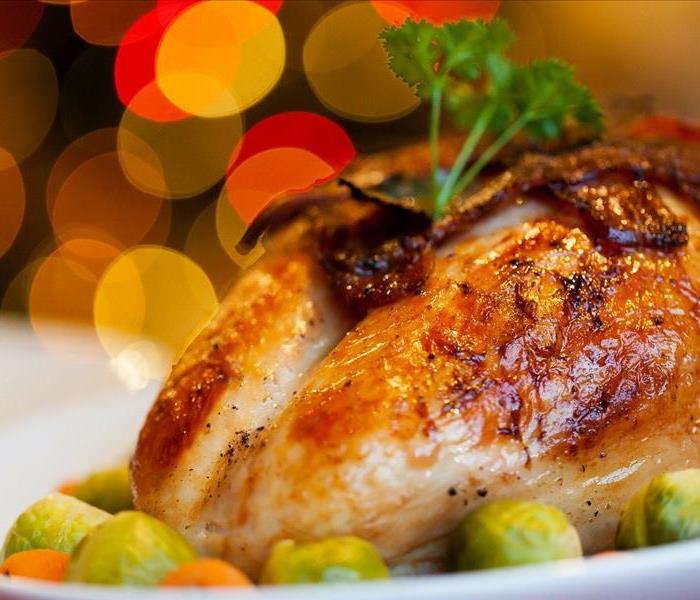 SERVPRO of Fernandina Beach/Jacksonville Northeast wishes you a Happy Thanksgiving Call us at 904.729.2401 if you run into any fire-related issues.
SERVPRO of Fernandina Beach/Jacksonville Northeast wishes you a Happy Thanksgiving Call us at 904.729.2401 if you run into any fire-related issues.
Source: National Fire Protection Association (NFPA)
Thanksgiving is the peak day for home cooking fires. Observing the following tips will help make sure you stay safe from fires on Thanksgiving Day.
- Stay in the kitchen when you are cooking on the stovetop so you can keep an eye on the food.
- Stay in the home when cooking your turkey and check on it frequently.
- Keep children away from the stove. The stove will be hot and kids should stay 3 feet away.
- Make sure kids stay away from hot food and liquids. The steam or splash from vegetables, gravy or coffee could cause serious burns.
- Keep the floor clear so you don’t trip over kids, toys, pocketbooks or bags. • Keep knives out of the reach of children.
- Keep matches and utility lighters out of the reach of children — up high in a locked cabinet.
- Never leave children alone in room with a lit candle.
- Make sure your smoke alarms are working. Test them by pushing the test button.
Fire From Unlikely Source Damages Fernandina Beach Home
11/13/2019 (Permalink)
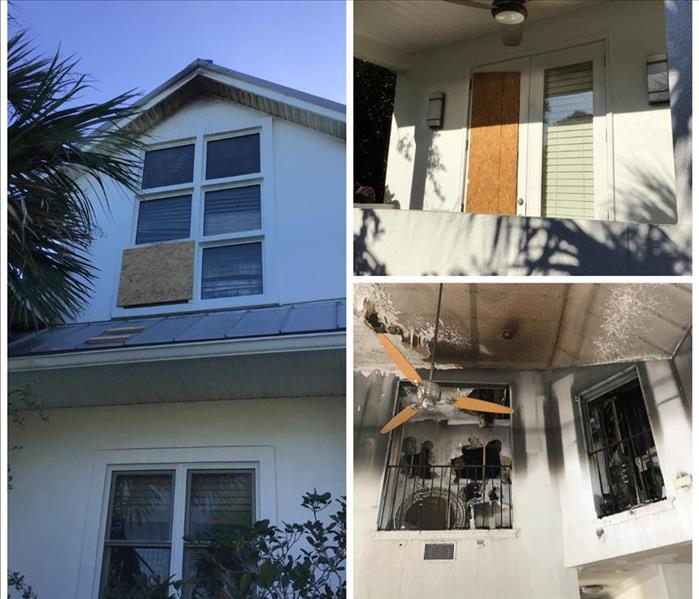 If you have damage from fire, soot, or smoke, call SERVPRO Fernandina Beach/Jacksonville Northeast at 904.729.2401.
If you have damage from fire, soot, or smoke, call SERVPRO Fernandina Beach/Jacksonville Northeast at 904.729.2401.
The cause of the fire that started in this Fernandina Beach home was from a rechargeable vacuum. SERVPRO of Fernandina Beach/Jacksonville Northeast handled the board-up to secure the property until water and fire restoration could begin.
Fire and smoke damage is highly destructive to property and structures if not properly cleaned in a timely manner. Smoke and soot residue can settle on surfaces throughout the property and will begin to permanently stain within hours. Water from firefighting efforts can also cause significant damage to both the structure of your home and your personal possessions. Our smoke and fire damage restoration begins with an initial assessment and estimate. We then board-up windows and doors and tarp roofs and other areas to secure your property and prevent further damage. If necessary, we can extract water and dry out areas damaged by firefighting efforts. Then we deodorize and restore your home or business to its original condition.
If you have damage from fire, soot or smoke, call us at 904.729.2401.
Halloween Fire Safety Tips
10/28/2019 (Permalink)
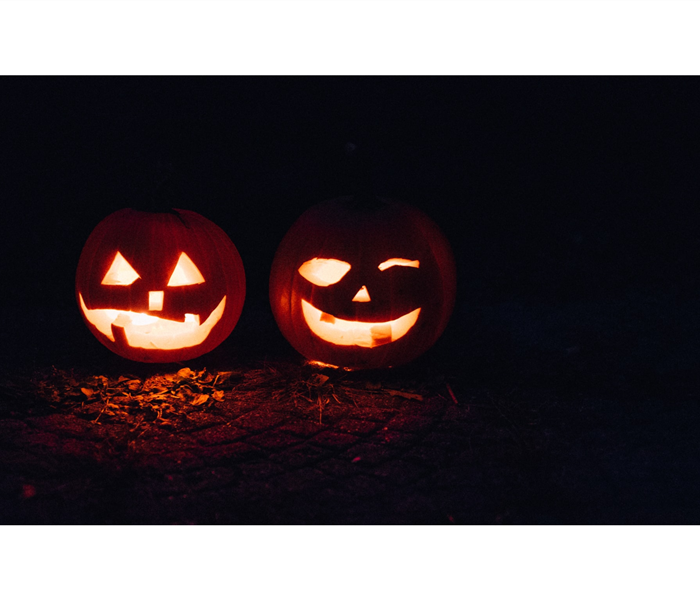 SERVPRO of Fernandina Beach/Jacksonville Northeast urges you to practice fire safety tips this Halloween.
SERVPRO of Fernandina Beach/Jacksonville Northeast urges you to practice fire safety tips this Halloween.
Source: NFPA
Halloween is a favorite time of year for young and old alike, but it does come with fire hazards. Following the tips below will ensure that you enjoy a safe Halloween holiday
Top five Halloween fire safety tips
- Use a battery-operated candle or glow stick in jack-o-lanterns
- When choosing costumes, stay away from long trailing fabric
- Teach children to stay away from open flames, including jack-o-lanterns with candles in them.
- Dried flowers, cornstalks, and crepe paper catch fire easily. Keep all decorations away from open flames and other heat sources like light bulbs and heaters
- Provide children with flashlights to carry for lighting or glow sticks as part of their costume.
- Remember to keep exits clear of decorations so nothing blocks escape routes. Make sure all smoke alarms are working.
SERVPRO of Fernandina Beach/Jacksonville Northeast wishes you a happy and safe Halloween.
Smoke Alarms Are Life Savers
7/22/2019 (Permalink)
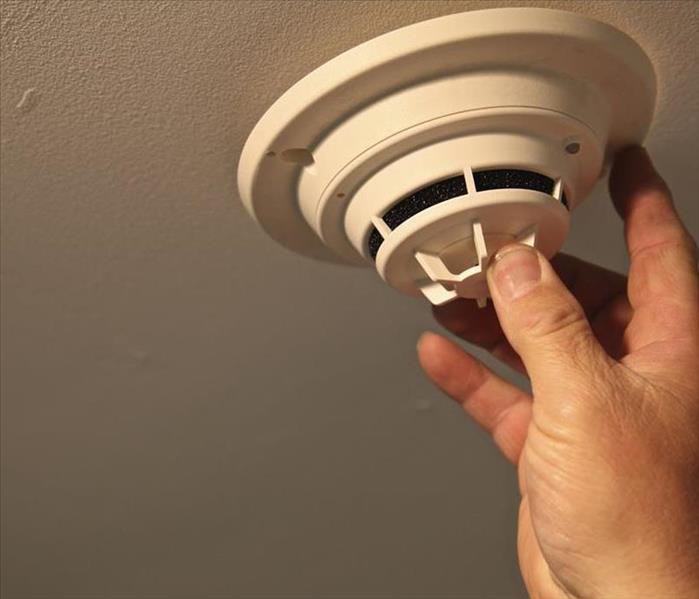 Smoke alarms should be placed in every bedroom, outside each sleeping area, and on every level, including the basement.
Smoke alarms should be placed in every bedroom, outside each sleeping area, and on every level, including the basement.
Smoke alarms save lives when properly installed and maintained, according to the National Fire Protection Association (NFPA).
In homes, smoke alarms should be placed in every bedroom, outside each sleeping area, and on every level, including the basement. Extra smoke alarms may be needed in large homes.
Test smoke alarms monthly using the test button. Smoke alarms with non-replaceable batteries need the entire smoke alarm unit replaced every ten years. Other alarms need batteries replaced every year and the unit replaced every ten years. If the alarm chirps signaling low battery, take the proper steps to replace the unit or the batteries immediately. Never disable or remove the battery from an alarm. Almost half of the fires where smoke alarms were present but did not activate had missing or disconnected batteries (NFPA).
Be sure your home has a fire emergency plan in place and conduct regular fire drills with your family.
Fire Facts:
- 7 people die every day from home fires
- 36 people suffer injuries as a result of home fires every day
- $7 billion property damage occurs every year from home fires
If you have a fire in your home, call SERVPRO Fernandina Beach/Jacksonville Northeast at 904.729.2401. We’ll treat your belongings with care and get your home back to normal.
How to Use Portable Fire Extinguishers
7/9/2019 (Permalink)
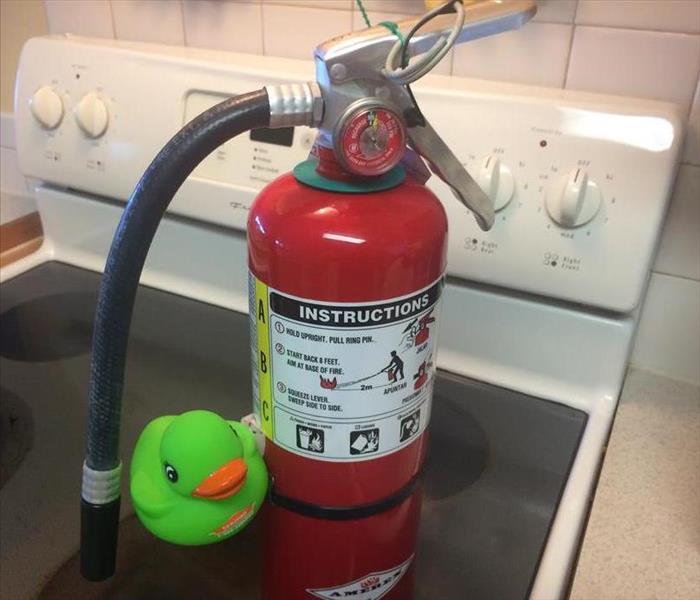 Our mascot, Dewey, points out directions for using fire extinguishers properly.
Our mascot, Dewey, points out directions for using fire extinguishers properly.
Portable fire extinguishers can be life and property saving when used correctly. Read the instructions on the fire extinguisher and become familiar with them before a fire breaks out. In order to operate an extinguisher, the National Fire Protection Association (NFPA) suggests remembering the word PASS:
- Pull the pin. Hold the nozzle pointing away from you and release the locking mechanism.
- Aim low. Point the extinguisher at the base of the fire. Hitting the tops of the flames will not be effective.
- Squeeze the lever slowly and evenly to release the agent.
- Sweep the nozzle from side-to-side. Most extinguishers will given you about 10-20 seconds of discharge time.
A portable fire extinguisher can save lives and property by putting out a small fire or containing it until the fire department arrives; but portable extinguishers have limitations. Because fire grows and spreads so rapidly, the #1 priority for residents is to get out safely.
Fourth of July Fire Safety Tips
7/3/2019 (Permalink)
 When setting off fireworks, it's always a good idea to keep a fire extinguisher handy.
When setting off fireworks, it's always a good idea to keep a fire extinguisher handy.
As you celebrate our nation's birthday, keep the following tips in mind to avoid any fire-related problems.
- Never light fireworks indoors or near dry grass.
- Keep a bucket of water and/or a fire extinguisher nearby.
- Know how to operate a fire extinguisher properly.
- Do not wear loose clothing while cooking on a barbecue.
- Use caution when using lighter fluid on a barbecue. Do not add fluid to an already lit fire, as the flame can flashback into the container and explode.
- Never grill in an enclosed area, as carbon monoxide could be produced.
Enjoy the holiday safely!
Safe Holiday Cooking
12/20/2018 (Permalink)
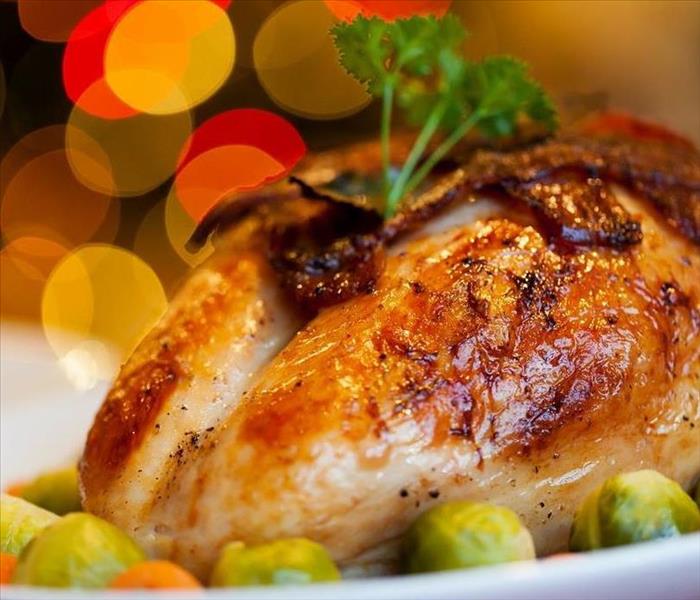 Follow these tips for safe cooking of your holiday feasts!
Follow these tips for safe cooking of your holiday feasts!
During the holidays, families get together to celebrate the season by preparing a delicious feast, but if you don’t practice safe cooking habits, your happy holiday could become hazardous very quickly.
According to the National Fire Protection Association, cooking is the main cause for home fire and injuries, with Thanksgiving and Christmas being the peak days for cooking-related fires.
Review the following safety tips to help ensure you can enjoy a safe holiday.
- Never leave cooking food unattended—stay in the kitchen when frying, grilling or broiling food. If you must leave the kitchen for even a short period of time, you should turn off the stove.
- Check food regularly while cooking and remain in the home while cooking. Use a timer as a reminder that the stave or oven is on.
- Keep the kids away from the cooking area. Enforce a “kid-free zone” and make children stay at least three feet from the stove.
- Keep anything flammable—pot holders, oven mitts, wooden utensils, paper or plastic back, food packaging, and towels or curtains—away from the stove, oven or any other appliance in the kitchen that generates heat.
- Do not wear loose clothing or dangling sleeves while cooking.
- Clean cooking surfaces on a regular basis to prevent grease build-up.
- Purchase a fire extinguisher to keep in the kitchen. Make sure you know proper use of extinguishers.
- Always check the kitchen before going to bed or leaving the home to make sure all stoves, ovens, and small appliances are turned off.
- Install a smoke alarm near the kitchen, on each level of the home, near sleeping areas and inside and outside bedrooms. Use the test button to check it each month. Replace all batteries at least once a year.
We at SERVPRO of Fernandina Beach/Yulee wish you a safe and happy holiday season!
Fire Escape Planning Tips for Nassau/North Jacksonville Homeowners
12/7/2018 (Permalink)
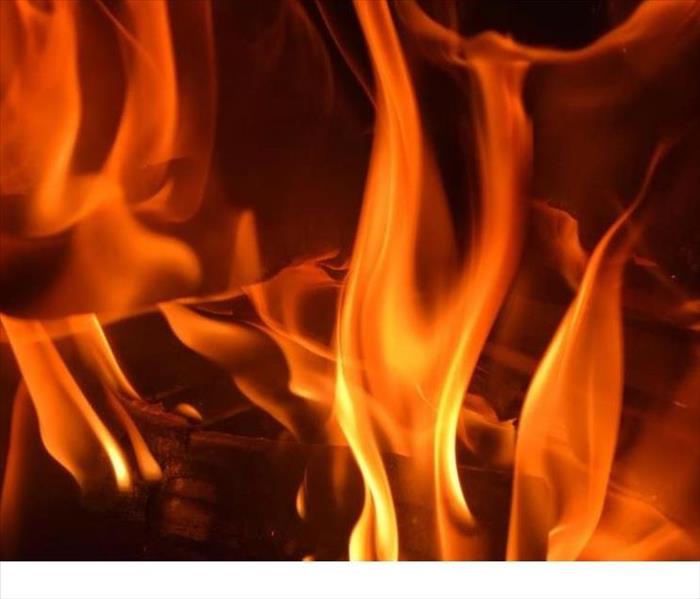 Use the link in this article for tips on creating your fire escape plan.
Use the link in this article for tips on creating your fire escape plan.
Source: National Fire Protection Association (NFPA)
Your ability to get out of your home during a fire depends on advance warning from smoke alarms and advance planning. After you create your home fire escape plan, put it to the test.
- Practice your home fire escape plan twice a year, making the drill as realistic as possible. See this fire escape planning grid for guidance on creating your escape plan.
- Make arrangements in your plan for anyone in your home who has a disability.
- Allow children to master fire escape planning and practice before holding a fire drill at night when they are sleeping. The objective is to practice, not to frighten, so telling children there will be a drill before they go to bed can be as effective as a surprise drill.
- It's important to determine during the drill whether children and others can readily waken to the sound of the smoke alarm. If they fail to awaken, make sure that someone is assigned to wake them up as part of the drill and in a real emergency situation.
- If your home has two floors, every family member (including children) must be able to escape from the second floor rooms. Escape ladders can be placed in or near windows to provide an additional escape route. Review the manufacturer's instructions carefully so you'll be able to use a safety ladder in an emergency. Practice setting up the ladder from a first floor window to make sure you can do it correctly and quickly. Children should only practice with a grown-up, and only from a first-story window. Store the ladder near the window, in an easily accessible location. You don't want to have to search for it during a fire.
- Always choose the escape route that is safest – the one with the least amount of smoke and heat – but be prepared to escape under toxic smoke if necessary. When you do your fire drill, everyone in the family should practice getting low and going under the smoke to your exit.
- Closing doors on your way out slows the spread of fire, giving you more time to safely escape.
- In some cases, smoke or fire may prevent you from exiting your home or apartment building. To prepare for an emergency like this, practice "sealing yourself in for safety" as part of your home fire escape plan. Close all doors between you and the fire. Use duct tape or towels to seal the door cracks and cover air vents to keep smoke from coming in. If possible, open your windows at the top and bottom so fresh air can get in. Call the fire department to report your exact location. Wave a flashlight or light-colored cloth at the window to let the fire department know where you are located.
Clear Your Escape Routes
Items that block doors and windows in your home could keep you from escaping in the event of a home fire. And that could mean the difference between life and death. So unblock your exits today! Key to your family’s safety is planning and practicing a home fire escape plan twice a year. Start by identifying two escape routes out of each room, if possible, then make sure that each of those escape routes can be used safely by everyone.
Please contact SERVPRO of Fernandina Beach/Yulee at (904) 729-2401 if you experience any fire damage to your residential or commercial property.
Holiday Fire Safety in Nassau County/North Jax
12/3/2018 (Permalink)
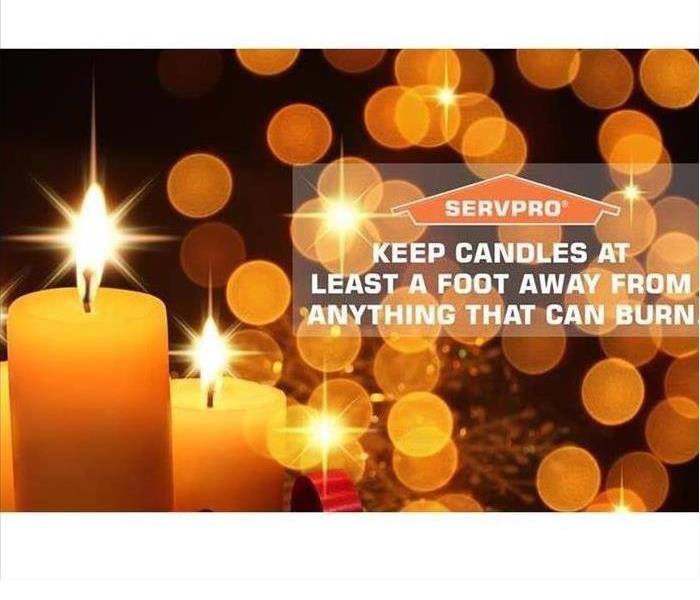 Be fire smart this holiday season. We at SERVPRO of Fernandina Beach/Yulee wish you and your family Happy Holidays!
Be fire smart this holiday season. We at SERVPRO of Fernandina Beach/Yulee wish you and your family Happy Holidays!
Nearly half of holiday decoration fires happen because decorations are placed too close to a heat source. It’s fun to decorate for the winter holidays, but holiday decorations can increase your risk for a home fire. As you deck the halls this season, be fire smart. Here are tips to help you stay safe from fire.
- Inspect holiday lights each year before you put them up. Throw away light strands with frayed or pinched wires.
- Water your Christmas tree every day. A dry tree is dangerous because it can catch on fire easily.
- Consider using battery-operated flameless candles, which can look, smell and feel like real candles.
- If you do use lit candles, make sure they are in stable holders and place them where they cannot be knocked down easily.
If you do experience fire damage at your home, call SERVPRO of Fernandina Beach/Yulee at (904) 729-2401. We’re available 24/7 to help you get your home back to normal.
What Nassau County/North Jax Residents Need to Know About Turkey Fryers
11/12/2018 (Permalink)
Source: National Fire Protection Association (NFPA)
NFPA discourages the use of outdoor gas-fueled turkey fryers that immerse the turkey in hot oil.
NFPA continues to believe that turkey fryers that use cooking oil, as currently designed, are not suitable for safe use by even a well-informed and careful consumer. These turkey fryers use a substantial quantity of cooking oil at high temperatures and units currently available for home use pose a significant danger that hot oil will be released at some point during the cooking process. In addition, the burners that heat the oil can ignite spilled oil. The use of turkey fryers by consumers can lead to devastating burns, other injuries, and the destruction of property. NFPA urges those who prefer fried turkey to seek out professional establishments, such as grocery stores, specialty food retailers, and restaurants, for the preparation of the dish, or consider a new type of "oil-less" turkey fryer."
For a demonstration showing the dangers of turkey fryers see this video.
We at SERVPRO of Fernandina Beach/Yulee hope you will consider this advice, and we wish you and your family a safe and Happy Thanksgiving.
Fire Damage Emergency Tips
11/6/2018 (Permalink)
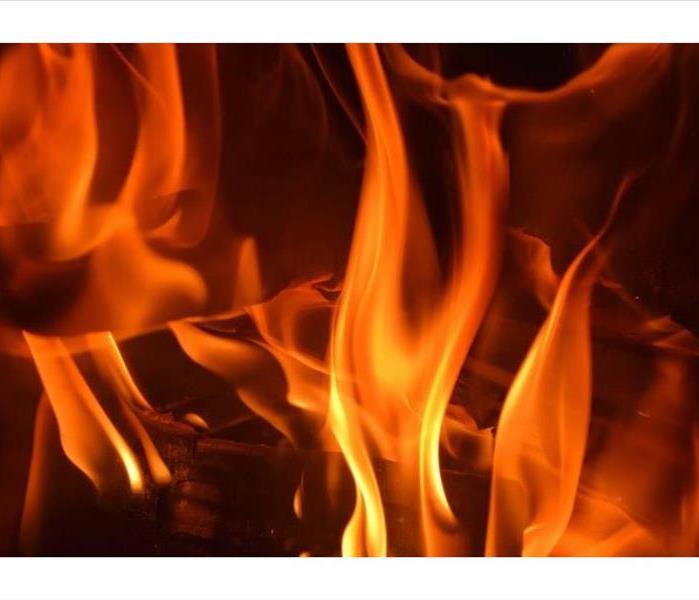 In the event of a fire in your home or business, these tips may help reduce damage and increase chances of a successful restoration.
In the event of a fire in your home or business, these tips may help reduce damage and increase chances of a successful restoration.
A fire can leave behind soot, smoke damage, and a host of other problems. Ceilings, walls, woodwork, carpeting, and floors will often need a thorough professional cleaning. If your home or business suffers a fire, it is important to take the appropriate steps to prevent further damage until SERVPRO of Fernandina Beach/Yulee professionals arrive. The following tips may help reduce damage and increase chances of a successful restoration.
What To Do After A Fire
- Limit movement in the home to prevent soot particles from being embedded into upholstery and carpets.
- Keep hands clean so as not to further soil upholstery, walls and woodwork.
- Place clean towels or old linens on rugs, upholstery and carpet traffic areas.
- If electricity is off, empty freezer and refrigerator and prop doors open.
- Clean and protect chrome with light coating of petroleum jelly or oil.
- Wash houseplants on both sides of leaves.
- Change HVAC filter.
- Tape double layers of cheesecloth over air registers.
What NOT To Do After A Fire
- Don't attempt to wash any walls or painted surfaces or shampoo carpet or upholstery without contacting us.
- Don't attempt to clean any electrical appliances that may have been close to fire, heat or water without consulting an authorized repair service.
- Don't use any canned or packaged food or beverages that may have been stored near the fire, heat or water.
- Don't turn on ceiling fixtures if ceiling is wet. The wiring may be damaged.
- Don't send garments to an ordinary dry cleaner. Improper cleaning may set smoke odor.
If you have fire damage, call SERVPRO of Fernandina Beach/Yulee at 904.729.2401 as soon as possible.
Fire Prevention Month: Importance of Smoke Alarms
10/15/2018 (Permalink)
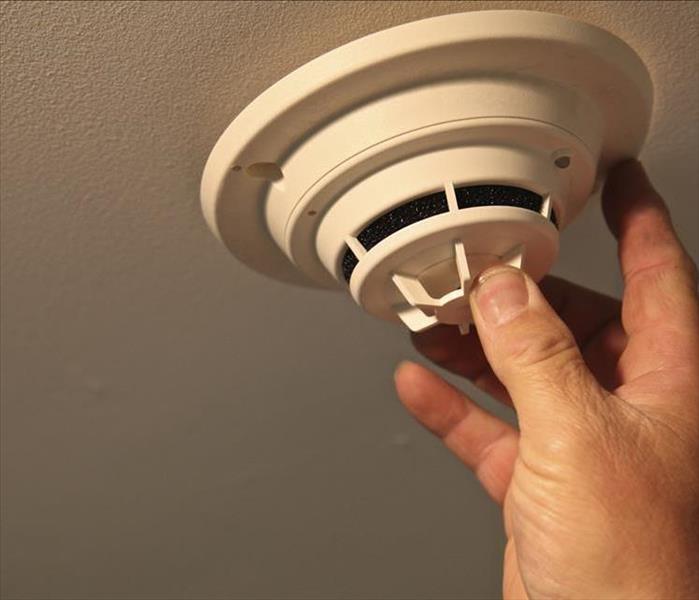 Test all smoke alarms at least once a month. Press the test button to be sure the alarm is working.
Test all smoke alarms at least once a month. Press the test button to be sure the alarm is working.
Smoke alarms are a key part of a home fire escape plan. When there is a fire, smoke spreads fast. Working smoke alarms give you early warning so you can get outside quickly. Roughly 3 out of 5 fire deaths happen in homes with no smoke alarms or no working smoke alarms.
FACTS ! ! ! SAFETY TIPS
- Install smoke alarms in every bedroom. They should also be outside each sleeping area and on every level of the home. Install alarms in the basement.
- Large homes may need extra smoke alarms.
- It is best to use interconnected smoke alarms. When one smoke alarm sounds, they all sound.
- Test all smoke alarms at least once a month. Press the test button to be sure the alarm is working.
- Current alarms on the market employ different types of technology including multi-sensing, which could include smoke and carbon monoxide combined.
- Today’s smoke alarms will be more technologically advanced to respond to a multitude of fire conditions, yet mitigate false alarms.
- A smoke alarm should be on the ceiling or high on a wall. Keep smoke alarms away from the kitchen to reduce false alarms. They should be at least 10 feet (3 meters) from the stove.
- People who are hard-of-hearing or deaf can use special alarms. These alarms have strobe lights and bed shakers
- Replace fire alarms when they are 10 years old.
Key Themes for Fire Prevention Week, October 7-13, 2018: “Look. Listen. Learn. Be aware – fire can happen anywhere.”
10/5/2018 (Permalink)
The latest statistics from the National Fire Protection Association (NFPA) show that if you have a reported fire in your home, you are more likely to die today than you were a few decades ago. This startling statistic is behind this year’s Fire Prevention Week theme: “Look. Listen. Learn. Be aware - fire can happen anywhere.™” Fire Prevention Week takes place October7-13,2018.
Through three simple calls-to-action, this year’s theme identifies basic but essential ways people can reduce their risk to fire and be prepared in the event of one:
- Look for places fire can start
- Listen for the sound of the smoke alarm
- Learn two ways out of each room
“People take safety for granted and are not aware of the risk of fire,” said Lorraine Carli, NFPA vice president of Outreach and Advocacy. “Paying attention to your surroundings, looking for available exits in the event of a fire or other emergency, and taking the smoke alarm seriously if it sounds can make a potentially life-saving difference in a fire or other emergency situation.”
This year’s Fire Prevention Week messages apply to virtually all locations. However, NFPA continues to focus on home fire safety, as the majority of U.S. fire deaths (four out of five) occur at home each year. In fact, the fire death rate (per 1000home fires reported to the fire department) was 10percent higher in 2016than in1980.
“While we’ve made significant progress in preventing home fires from happening, these statistics show that there’s still much more work to do when it comes to teaching people how to protect themselves in the event of one, and why advance planning is so critically important,” said Carli.
“Look. Listen. Learn. Be aware – fire can happen anywhere.” works to remind the public that fires can and do still happen – at home, as well as other locations - and that there are basic but vitally important steps people can take to remain safe.
As the official sponsor of Fire Prevention Week for more than 90years, NFPA works with local fire departments throughout North America to promote the campaign in their communities and reaches out to the public directly to encourage everyone to take action to be safe.
For a wealth of information and resources about this year’s “Look. Listen. Learn. Be aware – fire can happen anywhere.” campaign, visit www.firepreventionweek.org.
Fire Prevention Tip: Why Cleaning Dryer Vents is So Important!
7/12/2018 (Permalink)
 It is important to clean the lint filter before and after each load.
It is important to clean the lint filter before and after each load.
According to FEMA, failure to clean home dryers causes 34% of home dryer fires. Home dryer fires cause $35 million in property loss and can even cause injury or death.
To reduce the risk of these fires happening in your home, SERVPRO of Fernandina Beach/Yulee can help clean vents and ducts that may have lint build-up.
Other tips for keeping your dryer vents clean from the National Fire Protection Association include cleaning the lint filter before and after each load and making sure the outdoor vent flap will open and is not restricted by obstacles. Do not use a dryer that does not have a lint filter.
Your first hint that you need to check your vents is when your clothing doesn’t dry after a normal drying cycle.
Other hints include a musty odor in the clothing following the drying cycle, clothes that seem unusually hot to the touch, or excessive heat in the laundry room.
If you would like your dryer vent cleaned to minimize risk of fires, call SERVPRO of Fernandina Beach/Yulee at 904.729.2401.
Fourth of July Tip From NFPA: Attend Public Fireworks Displays
6/28/2018 (Permalink)
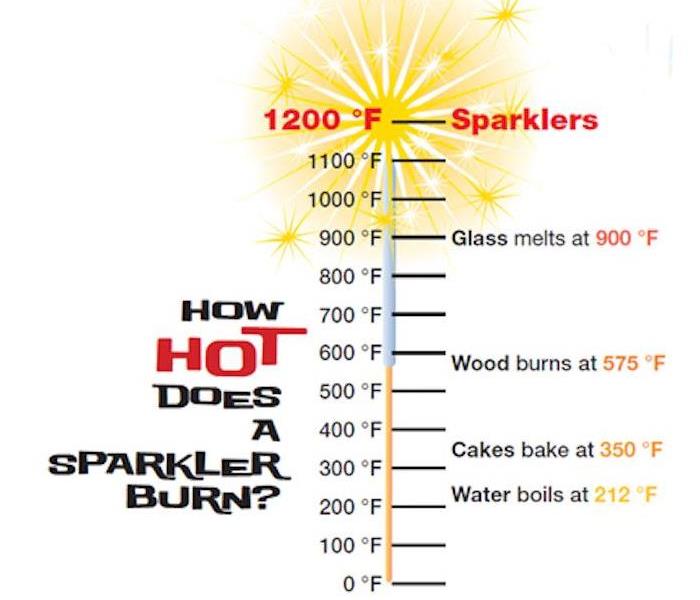 In recent years, fireworks have been one of the leading causes of injuries serious enough to require hospital emergency room treatment.
In recent years, fireworks have been one of the leading causes of injuries serious enough to require hospital emergency room treatment.
Legal or not fireworks are too risky for amateurs
That's the message from the National Fire Protection Association who urges families to attend public fireworks displays rather than using fireworks at home or parties. NFPA says that... Permanent scarring, loss of vision, dismemberment – these are too often the harsh realities of amateur fireworks use. To keep the public safe from fireworks-related injuries and deaths, NFPA urges everyone to treat fireworks, whether legal or illegal for consumers, as suitable only for use by trained professionals. According to NFPA, amateur fireworks use endangers not only the users, but also bystanders and surrounding property and structures. Pyrotechnic devices ranging from sparklers to aerial rockets cause thousands of fires and serious injuries each year.
"There are no such things as safe fireworks," says NFPA Vice President of Outreach and Advocacy Lorraine Carli. "The power and danger of fireworks should not be underestimated.”
In recent years, fireworks have been one of the leading causes of injuries serious enough to require hospital emergency room treatment. Fireworks can result in severe burns, fractures, scars or even disfigurement or death. The thousands of serious injuries each year typically harm the eyes, head or hands, and are mostly reported in states where fireworks are legal. Even sparklers, which are considered by many to be harmless, reach temperatures of more than 1,000°F.
"In the hands of amateurs, fireworks are especially dangerous," says Carli. "Fireworks are unpredictable. They can lead to catastrophe, causing injury, permanent scarring, or even death."
Wooded areas, homes, and even automobiles have become engulfed in flames because of fireworks. Fireworks-related fires have typically caused at least $20 million in property loss each year. A substantial portion of the structure fire property loss due to fireworks typically involves bottle rockets or other fireworks rockets. These can land on rooftops, wedge within certain structures and retain enough heat to cause a fire.
"For most people, family and home represent security and safety, a haven to share our hopes, dreams, and struggles,” says Carli. “Imagine risking all of that for a few seconds of entertainment. It’s not worth it. Avoid fireworks injuries and damage by playing it safe. There are safer alternatives to using fireworks on the Fourth of July or at any other time."
Public fireworks displays are one of those alternatives. Conducted by trained professionals, these displays are the smartest and safest fireworks alternative for anyone because they are established under controlled settings and regulations. After these displays, or any other time, children should never pick up fireworks that may be left over. Fireworks that have been ignited and fail to immediately explode or discharge can cause injury because they may still be active. Children should always tell an adult if they find fireworks rather than picking up smoking or charred fireworks themselves, which is just too risky.
Fernandina Beach/Yulee/North Jax Residents: Ring in the New Year Safely!
12/22/2017 (Permalink)
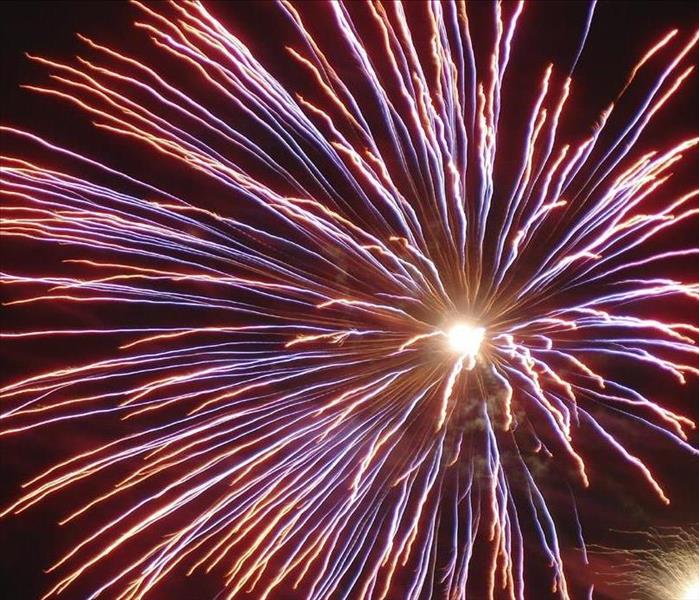 We at SERVPRO Fernandina Beach/Yulee/North Jax wish you a safe and Happy New Year!
We at SERVPRO Fernandina Beach/Yulee/North Jax wish you a safe and Happy New Year!
Fireworks are a popular way to celebrate and ring in the New Year, but injuries, fires and home insurance claims can put a damper on this longstanding holiday tradition.
Fireworks are beautiful and fun, but dangerous…
In 2008, fireworks caused about 22,500 fires and $42 million in property damage, and even if you have the right home insurance coverage, setting off fireworks on your property entails risks. In addition to putting your home and your neighbors' homes in danger, fireworks can cause serious injuries. In 2008, hospital emergency rooms treated about 7,000 fireworks-related injuries, according to National Fire Protection Association (NFPA). About 40 percent of these injuries happened to children under the age of 18.
Protect yourself and your family…
If consumer fireworks are legal where you live and you decide to set them off on your own, be sure to follow these important safety tips:
- Never allow children to handle or ignite fireworks, including sparklers
- Read and follow all warnings and instructions.
- Wear eye protection.
- Be sure other people are out of range before lighting fireworks. Never throw or point fireworks at people or animals.
- Only light fireworks outdoors on a smooth, flat surface away from homes, dry leaves and flammable materials.
- Never try to relight fireworks that have not fully functioned.
- Keep a bucket of water and a garden hose nearby in case of a malfunction or fire.
Make sure that your home is equipped with working smoke alarms on every level, and that everyone in the home knows the sound the alarm makes and what it signifies. Have a home fire escape plan with two ways out of every room and a designated outside meeting place. Practice the plan with all members of your household both at night and during the day.
We at SERVPRO Fernandina Beach/Yulee/North Jax wish you a safe and Happy New Year!
Using Candles Safely Over the Holidays
12/4/2017 (Permalink)
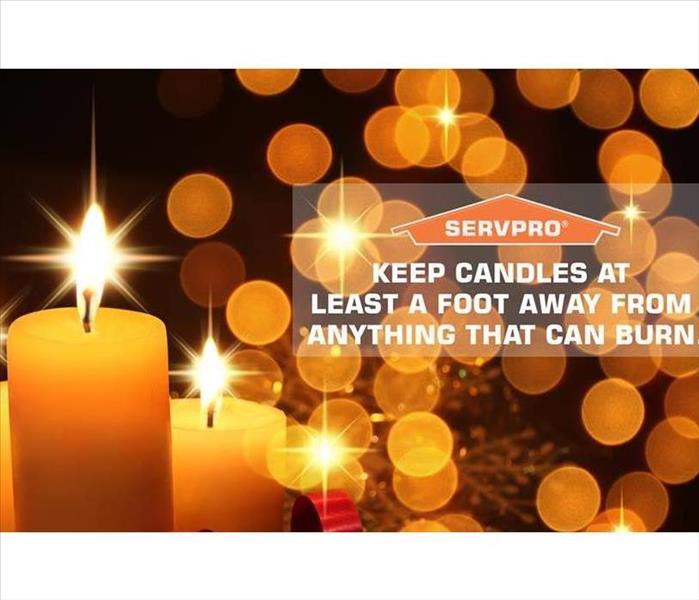 We at SERVPRO of Fernandina Beach/Yulee wish you a safe and Merry Christmas!
We at SERVPRO of Fernandina Beach/Yulee wish you a safe and Merry Christmas!
The National Candle Association and the National Association of State Fire Marshals are urging consumers to take special care when using candles this holiday season, and to follow these important fire-safety rules:
- Always keep a burning candle within your sight. Never leave a burning candle unattended.
- Keep burning candles away from combustible items. Be especially careful not to place candles near flammable decorations or Christmas greenery.
- Always use a candleholder specifically designed for candle use. The holder should be sturdy, heat resistant and big enough to collect dripping wax.
- Keep candles out of the reach of children and pets.
- Trim candlewicks to 1⁄4 inch before lighting or re-lighting. Keep the wax-pool free of wick trimmings, dust, matches and debris at all times.
- Never move a candle when it is burning.
We at SERVPRO of Fernandina Beach/Yulee wish you and your family a safe and Merry Christmas!
What You Need To Know About Christmas Lights
11/28/2017 (Permalink)
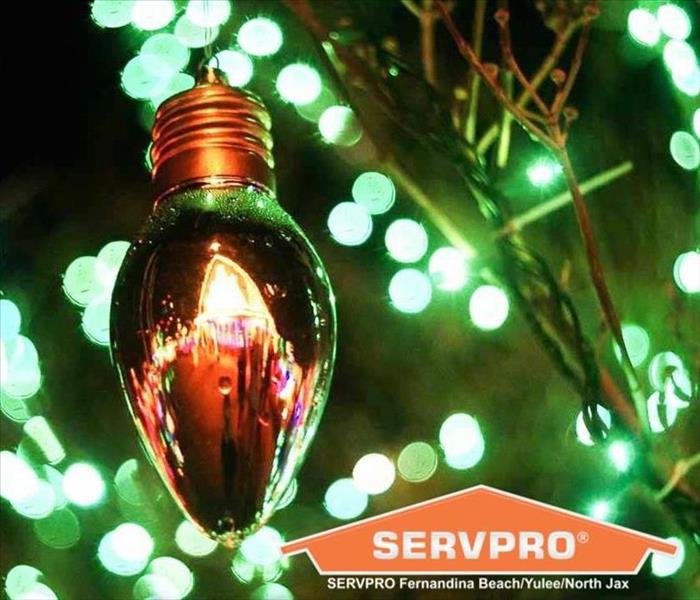 Don’t leave Christmas lights running when you go to bed at night or when you leave the house.
Don’t leave Christmas lights running when you go to bed at night or when you leave the house.
Fernandina Beach/North Jax houses all lit up with Christmas lights are beautiful sights to behold. But whether stringing lights across your roof and around your home or using them indoors, take a few moments to run through a quick safety checklist.
- Before you string up a single strand of lights, carefully check them for cracked cords frayed ends or loose connections.
- The combination of shorts in electrical lights and a tinder-dry tree can be deadly. There are 250 Christmas tree fires and 14 related deaths each year, according to the U.S. Fire Administration. So keep your tree well-watered. Not only will it stay fresh and green, but it might also keep your house from burning down.
- Modern lights have fused plugs, preventing sparks in case of a short circuit. Ditch old strands of lights that don’t have fuses and get a set of newer, safer lights.
- Don't connect more than three strands of mini-string sets and a maximum of 50 bulbs for screw-in bulbs.
- If bulbs have burned out, replace them right away, but make sure you use the correct wattage bulbs.
- Water and debris can get into outdoor sockets, so make sure outdoor lights are plugged into a ground fault circuit interrupter outlet to reduce the risk of shorts and shocks. Hire a licensed electrician if you need to install GFCI outlets.
- Keep an eye on extension cords, as they can occasionally overheat. Just touch-test the cord. If it’s hot, unplug it.
- Don’t use tacks, nails or screws to hang lights, which can pierce the cable and become electrified. Use insulated hooks instead.
- When running extension cords along the ground, make sure to elevate plugs and connectors with a brick to keep snow, water and debris out of the connections.
- Tape down any ground-level extensions cords to prevent people from tripping over them.
- Check to make sure lights have been rated by a testing laboratory. You can see a list of federally recognized labs on the OSHA website.
- Not all lights are rated for outdoor use. Indoor lights often have thinner insulation, which can become cracked and damaged when exposed to the elements outdoors. So make sure the ones you string up on the house belong out there.
- Don’t leave Christmas lights running when you go to bed at night or when you leave the house.
- When you put your lights back into storage after the holidays, make sure to place them in a well-sealed container to prevent possible water damage and to block hungry rodents looking to turn the cords into lunch.
These tips will help you stay safe and prevent fires. Of course, if you do have a fire, call 9-1-1. Follow these fire safety tips and call SERVPRO of Fernandina Beach/Yulee at 904-729-2401 if you need help with professional clean-up.
Don't Let A Cooking Fire Ruin Your Thanksgiving
11/20/2017 (Permalink)
Thanksgiving is right around the corner, and it's a wonderful time to enjoy the company of others. Most of us will be sitting around dining room tables and feasting with family and loved ones. Some of us will spend time in the emergency room after a grease fire or some other cooking accident. According to the National Fire Protection Association, more cooking fires occur in the U.S. on Thanksgiving Day than on any other day of the year
Here are some stats and some tips.
Cooking fires by the numbers
Based on 2010-2014 annual averages:
- Cooking equipment was the leading cause of home fires and fire injuries, causing 46% of home fires that resulted in 19% of the home fire deaths and 44% of the injuries.**
- Two-thirds (66%) of home cooking fires started with the ignition of food or other cooking materials.
- Clothing was the item first ignited in less than 1% of these fires, but clothing ignitions led to 18% of the home cooking equipment fire deaths.
- Ranges or cooktops accounted for the majority (62%) of home cooking fire incidents.
- Unattended equipment was a factor in one-third (33%) of reported home cooking fires and half (49%) of the associated deaths..
- Frying dominates the cooking fire problem. (See how to put out grease fires and things you should know about frying turkeys below.)
- Thanksgiving is the peak day for home cooking fires.
Steps to put out a grease fire:
- Turn off source of heat (burner / element).
- Do NOT pour water on it.
- Attempt to remove all oxygen from the flame. You can cover with another pot, or baking pan.
- If you can't cover it, dump baking soda (lots of it) on it.
If you suffer a fire damage event, please call SERVPRO Fernandina Beach/Yulee/North Jacksonville at 904-729-2401—even over the holiday. Refer to our Fire Damage Tips—Until Help Arrives Guide and follow these tips to protect yourself and your property.
Avoiding Turkey Fryer Fires
11/14/2017 (Permalink)
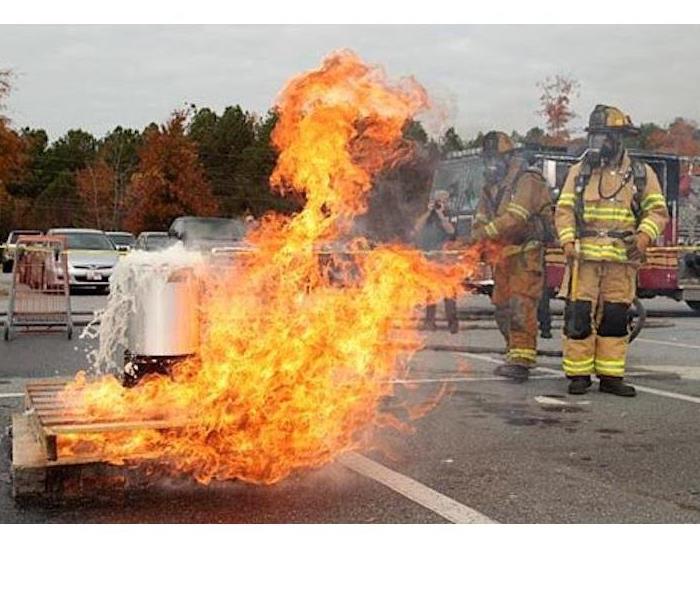 Putting too much oil in the fryer or dropping in a frozen or partially thawed turkey lead to most turkey fryer fires.
Putting too much oil in the fryer or dropping in a frozen or partially thawed turkey lead to most turkey fryer fires.
Thanksgiving brings up warm memories of gathering with family and the delicious aroma of cooking turkeys and other goodies. In North Florida, a lot of us like to deep-fry our holiday birds—frying is fast and keeps the moisture in. As good as fried turkeys are, we need to keep our wits about us when using this preparation method.
Many of the more serious cooking fire incidents occur due to the increasing popularity of fryers used for deep-frying turkeys. According to last year's report, fire departments across the country respond to 1,000 fires a year in which a deep fryer is involved. The NFPA says that deep fryers cause an average of five deaths, 60 injuries and more that $15 million in property damage each year.
Two primary oversights that lead to danger: too much oil in the fryer and dropping in a frozen or partially thawed turkey.
It is important to keep the fryer a far enough distance from any structures to prevent them from catching fire. If a turkey fryer does catch fire, the most important thing to remember is NOT to use water to put out the fire. Like with any other grease fire, water will just cause the oil to splash and spread the fire further. Fire extinguishers (preferably Class K) are the most reliable means of containing the flames. Even if you have one on hand, still call 911 immediately and have the professionals take care of it.
In the meantime, make sure that everyone has been moved a safe distance from the fryer while you wait for the fire department
If you suffer a fire damage event, please call SERVPRO Fernandina Beach/Yulee/North Jacksonville at 904-729-2401—even over the holiday. Refer to our Fire Damage Tips—Until Help Arrives Guide and follow these tips to protect yourself and your property.
Protecting Fernandina Beach/Yulee Kids from Fire-Related Injuries
10/10/2017 (Permalink)
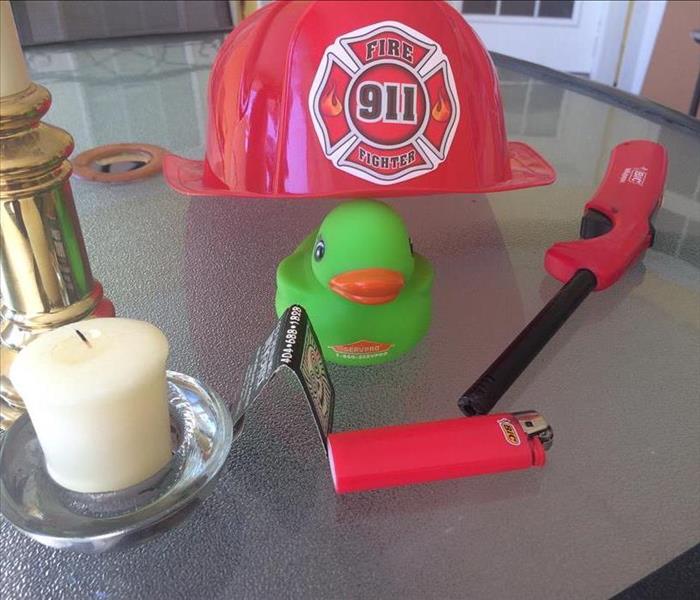 Dewey our mascot Duck says, "Kids, don't play with fire."
Dewey our mascot Duck says, "Kids, don't play with fire."
Children playing with fire cause hundreds of deaths and injuries each year. Preschoolers and kindergartners are most likely to start these fires, typically by playing with matches and lighters, and are most likely to die in them. SERVPRO of Fernandina Beach/Yulee/North Jacksonville picked up the following tips from the National Fire Protection Association (NFPA).
Parent’s Fire Safety Tips
- Children experience fire interest. They may ask questions such as how hot is fire or show an interest in fire through playing with fire trucks or cooking on a play stove. This is healthy, and it is time to begin educating about fire.
- Fire starting happens when children begin to experiment with fire using matches and lighters. Many fires happen when young children are left alone, even for a short period of time, and have access to matches and lighters. Parents must have clear rules and consequences about fire misuse.
- Grown-ups can help keep fire out of the hands of children.
- Store matches and lighters out of children’s reach and sight, up high, preferably in a locked cabinet or container.
- Never leave matches or lighters in a bedroom or any place where children may go without supervision.
- Teach young children and school-age children to tell a grown-up if they see matches or lighters. Children need to understand that fire is difficult to control, it is fast and can hurt as soon as it touches you.
- A child with an interest in fire can lead to fire starting and result in repeated firesetting behavior.
- It is important for grown-ups to discourage unsupervised fire starts.
- Never use lighters or matches as a source of amusement for children; they may imitate you.
- Never assign a young child any tasks that involve the use of a lighter or matches (lighting candles, bringing a lighter to an adult to light a cigarette or the fireplace, etc.)
- If your child expresses curiosity about fire or has been playing with fire, calmly but firmly explain that matches and lighters are tools for adults only.
- Use only lighters designed with child-resistant features. Remember, child-resistant does not mean child-proof.
We hope it never happens, but if you have a fire in your home and need fire damage restoration, please call SERVPRO of Fernandina Beach /Yulee /North Jacksonville at 904.729.2401
SERVPRO Fernandina Beach/Yulee/North Jax Shares Tips on Using Fire Extinguishers
10/9/2017 (Permalink)
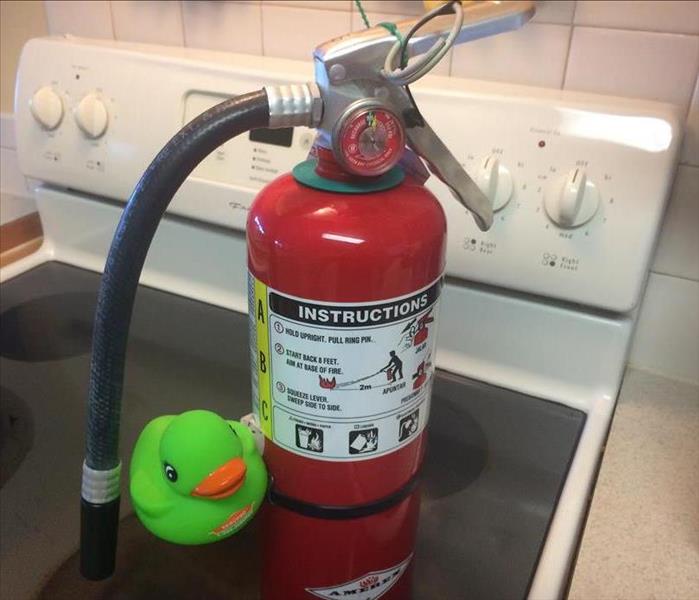 Our mascot Dewey shares tips on fire extinguishers. Fortunately, Dewey is an expert on Fires and all things Water.
Our mascot Dewey shares tips on fire extinguishers. Fortunately, Dewey is an expert on Fires and all things Water.
Since it’s fire prevention week, we wanted to share a few helpful tips on using fire extinguishers. Using a fire extinguisher isn’t rocket science, but there are a few basics you should know. According to FEMA, the majority of Americans don’t know how to use an extinguisher, even if they have one in their home. This is an alarming knowledge gap. Fires double in size every 60 seconds, so you don’t want to be fumbling around in an emergency situation, reading over the instruction manual as a small flame on the stove grows into an inferno.
Most fire extinguishers for homes and public spaces are classified as Class ABC extinguishers, meaning they’re suitable for putting out wood and paper fires, flammable liquid fires, and electrical fires—not grease fires. (See below for grease fires).
Using a Fire Extinguisher: Remember PASS, which stands for:
P—Pull the pin. Hold the nozzle pointing away from you and release the locking mechanism.
A—Aim low. Point the extinguisher at the base of the fire. Hitting the tops of the flames will not be effective.
S—Squeeze the trigger slowly and evenly to release the agent.
S—Sweep the nozzle from side to side. Most extinguishers will give you about 10-20 seconds of discharge time.
You can buy an ABC extinguisher for about $30 -$60 on Amazon or at your nearest hardware store. Get the biggest one you can comfortably handle to maximize its discharge pressure, time, and range.
Steps to put out a grease fire:
- Turn off source of heat (burner / element).
- Do NOT pour water on it.
- Attempt to remove all oxygen from the flame. You can cover with another pot, or baking pan.
- If you can't cover it, dump baking soda (lots of it) on it.
If you suffer a fire damage event, please call SERVPRO Fernandina Beach/Yulee/North Jacksonville at 904-729-2401. Refer to our Fire Damage Tips—Until Help Arrives Guide and follow these tips to protect yourself and your property.
Nassau County & North Jax: October 8-14 Is Fire Prevention Week
10/6/2017 (Permalink)
 Message from SERVPRO Fernandina Beach/Yulee/North Jax. In a fire, every second counts. Plan 2 ways to exit each room.
Message from SERVPRO Fernandina Beach/Yulee/North Jax. In a fire, every second counts. Plan 2 ways to exit each room.
The following is from the National Fire Protection Association (NFPA)…
In a fire, seconds count. Seconds can mean the difference between residents of our community escaping safely from a fire or having their lives end in tragedy.
That’s why this year’s Fire Prevention Week theme: “Every Second Counts: Plan 2 Ways Out!” is so important. It reinforces why everyone needs to have an escape plan. Here’s this year’s key campaign messages:
- Draw a map of your home with all members of your household, marking two exits from each room and a path to the outside from each exit.
- Practice your home fire drill twice a year. Conduct one at night and one during the day with everyone in your home, and practice using different ways out.
- Teach children how to escape on their own in case you can’t help them.
- Make sure the number of your home is clearly marked and easy for the fire department to find.
- Close doors behind you as you leave – this may slow the spread of smoke, heat, and fire.
- Once you get outside, stay outside. Never go back inside a burning building.
Here is a helpful quiz to test your fire prevention knowledge.
Here is information about SERVPRO Fernandina Beach/Yulee/North Jacksonville’s fire damage services. Call us at 904-729-2401 if you have fire damage.
Celebrate Summer Safely
7/21/2017 (Permalink)
Summer is a time to enjoy the great outdoors on Amelia Island and in North Jacksonville, but it is also important to keep safety in mind. Consider the following tips, provided by the National Fire Protection Association to keep you and your family safe all summer long.
- When using a charcoal grill, only use starter fluids designed for barbecue grills; do not add fluid after coals have been lit.
- When using a gas grill, ensure the hose connection is tight; check hoses for leaks. Applying soapy water to the hoses will easily and safely reveal any leaks.
- Always build a campfire downwind from the tent area. Clear vegetation and dig a pit before building your fire. Extinguish the fire before going to sleep or leaving the campsite.
- Store liquid fire starter (not gasoline) away from your tent and campfire and only use dry kindling to freshen a campfire.
- Observe burn bans. Check with local authorities to see when these are in place, as when the local wildfires were raging. Currently there are no bans in in Nassau County. In Duval County, open burning of yard debris is prohibited year round per county ordinance.
SERVPRO Fernandina Beach/Yulee/North Jacksonville wishes you a happy summer!
What You Need to Know About Smoke Alarms
6/20/2017 (Permalink)
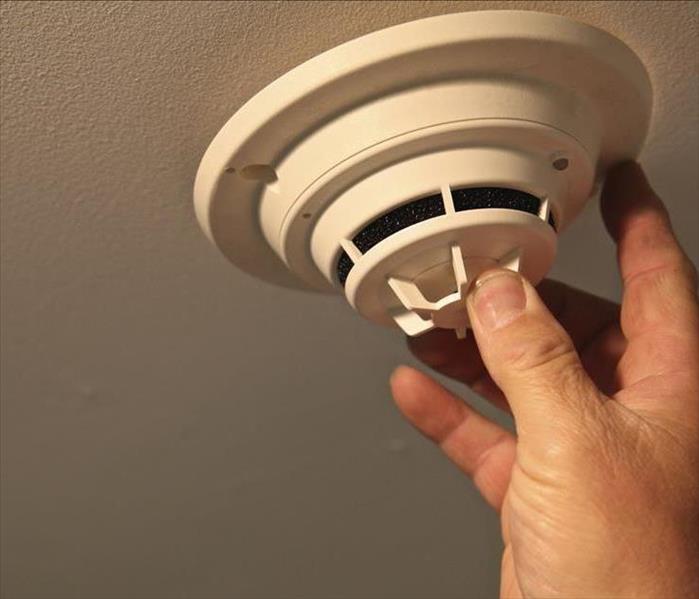 When properly installed and maintained, smoke alarms save lives.
When properly installed and maintained, smoke alarms save lives.
Smoke alarms save lives when properly installed and maintained.
In homes, smoke alarms should be in every bedroom, outside each sleeping area, and on every level, including the basement. Extra smoke alarms may be needed in large homes.
Test smoke alarms monthly using the test button. Smoke alarms with non-replaceable batteries need the entire smoke alarm unit replaced every ten years. Other alarms need batteries replaced every year, and the unit replaced every ten years. If the alarm chirps signaling low battery, take the proper steps to replace the unit or the batteries immediately. Never disable or remove the battery from an alarm. Almost half of fires where smoke alarms were present but did not activate had missing or disconnected batteries according to the National Fire Protection Association (NFPA).
If you need help installing, testing or changing batteries in your smoke alarms, contact your local fire department, an electrician or the American Red Cross.
Be sure your home has a fire emergency plan in place and conduct regular fire drills with your family.
If you have a fire in your home or business, call SERVPRO of Fernandina Beach/Yulee/North Jacksonville at 904-729-2401.
Fire Ravages Callahan Family Home
6/2/2017 (Permalink)
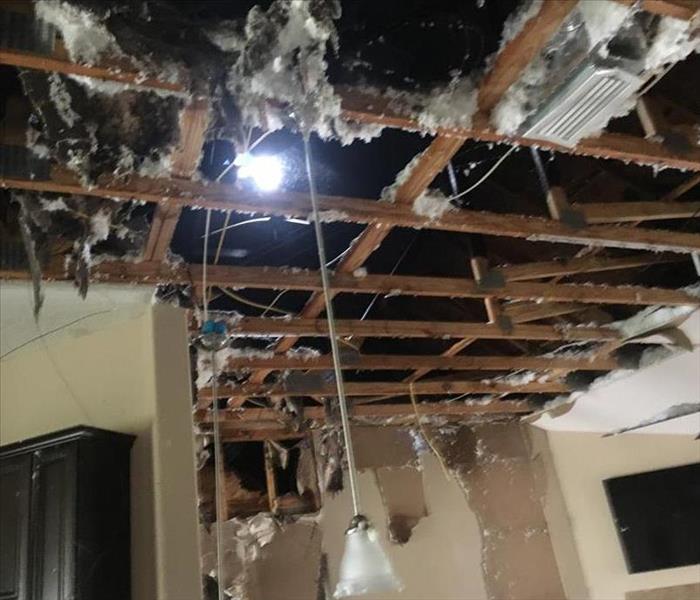 The fire department had to cut out the ceilings and some of the rafters to reach the flames and extinguish the fire.
The fire department had to cut out the ceilings and some of the rafters to reach the flames and extinguish the fire.
This story begins with a lightning strike to the roof of this Callahan family home, which ignited a fire in the attic. The fire department arrived to extinguish the fire but in order to reach the flames; they had to cut out the ceilings and some of the rafters before dousing the entire space with water hoses. There was blown-in insulation in the attic, and all of this became drenched with water as it snowed down into the living space below. What was once a cozy home now looked like a war zone.
When SERVPRO Fernandina Beach/Yulee/North Jacksonville arrived on the scene, they were greeted by frantic homeowners who had seen their home destroyed. The home had suffered from not only fire and smoke damage, but also extensive water damage from firefighting efforts. We assured the homeowners that we could, and would, restore their home to its pre-fire condition.
SERVPRO of Fernandina Beach/Yulee/North Jacksonville has the specialized fire and water damage cleanup and restoration training and experience to quickly restore a fire-damaged home to pre-fire condition. We also have specific training and equipment for odor removal and deep cleaning of upholstery and carpet.
If you ever suffer damage from a fire, call us at (904) 729-2401. Here are fire emergency tips outlining what you should and should not do before we arrive. First and foremost, be safe. Is it safe to stay in the house? Watch out for electrical and "slip and fall" hazards. Also, wet materials can be VERY heavy, so be careful lifting! Also, try to limit movement in the home to prevent soot particles from being embedded into upholstery and carpets.
Staying Safe From Fire When Grilling
5/17/2017 (Permalink)
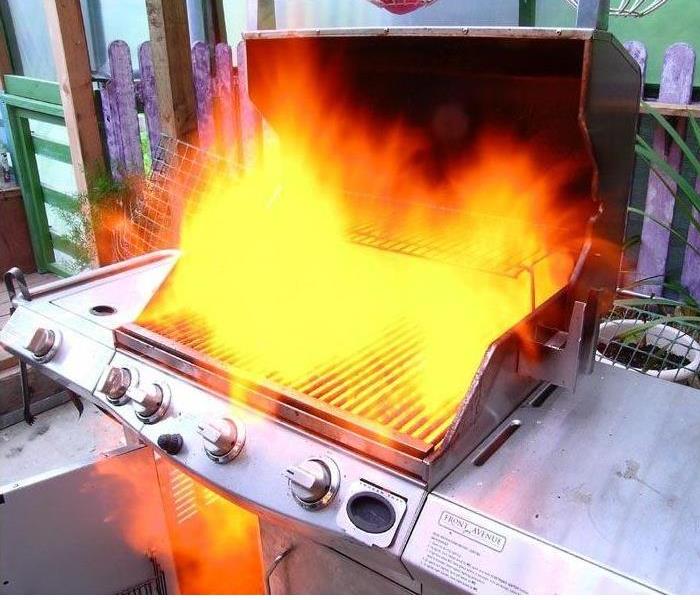 Fire safety, including grilling safety, is especially important in our drought-ridden community.
Fire safety, including grilling safety, is especially important in our drought-ridden community.
Grilling is a popular way to relax on Amelia Island, but it poses the risk of fire and related injuries. With all of the recent wildfires, fire safety is especially important in our drought-ridden community.
Here are important tips to keep your home and family safe when grilling:
- Only use propane and charcoal barbecue grills outdoors.
- Always supervise the grill.
- Place the grill well away from the home and deck railings, and out from under eaves and overhanging branches.
- Keep children and pets at least three feet away from the grill area.
- Remove grease or fat buildup from the grills. Grease and fat burn quickly and can cause burn injuries or fires.
- Clean the grease or fat build-up after every use. Doing so not only decreases the risk of fire, but also helps the food cook better.
- Check the propane tank, hose, and all connection points for leaks. If you smell gas when the grill is on, turn off the tank and burners immediately.
- If you have a charcoal grill, use only charcoal starter fluid to light the grill. However, charcoal chimney starters allow you to start the charcoal using paper as a fuel.
- Keep charcoal fluid out of the reach of children and away from heat sources.
- After you finish grilling, let the coals completely cool before disposing in a metal container.
Following these tips will ensure that fire will not damage your home or property. In the event fire does strike you or someone you know, SERVPRO Fernandina Beach/Yulee/North Jacksonville provides emergency fire restoration services. Call 904-729-2401, and we’ll be there to help 24/7.
PREPARING FOR NASSAU COUNTY WILDFIRES
4/27/2017 (Permalink)
 Disposal of yard debris, rapid wildfire growth, and weather conditions have the Florida Forest Service reminding citizens to exert extreme caution.
Disposal of yard debris, rapid wildfire growth, and weather conditions have the Florida Forest Service reminding citizens to exert extreme caution.
You have undoubtedly heard about recent wildfires in our area. Residents and firefighters in Florida must be vigilant year-round for potential wildfires. Though, there is no particular wildfire “season” in Florida, there are conditions that make forested areas more susceptible to ignition. The Florida Forest Service, along with other local, state, and federal agencies, monitor weather, humidity, drought, wind, and natural fuel conditions in an effort to predict when fires are more likely to occur, as well as warn the public and the first responders.
Wildfires consume hundreds of homes in the United States every year. Studies show that 80 percent of these homes could have been saved if owners had followed a few fire-wise safety practices. Here are a few basic measures you can take to make you, your home, and property better prepared for an approaching wildfire:
- Create a defensible zone between your home and the surrounding area—that is, a zone fee of flammable plants and debris—of at least 30 feet around your home and other structures.
- Take steps to mitigate fuel around your property. This means you should remove dead branches, shrubbery, and other debris. Also, mow grass regularly and prune tree limbs to a height of 10 to 15 feet from ground level. Otherwise, lower limbs draped with vines and debris could act as “ladder fuel” by igniting and allowing fire to reach your roof and soffits. Finally, remove accumulated leaves from your roof and gutter.
- Pay particular attention to the roof, eaves, vents, walls, decks, windows, and doors.
Other Things You Can Do to Prepare for Wildfires:
- Prepare your family by creating a Family Disaster Plan
- Train your family how to use a fire extinguisher and keep them on hand.
Know where all home utility shut-offs are located. - Plan for evacuations via several different routes. Designate a meeting location for family members. Know points of contact. Keep a list of phone numbers.
- Assemble an emergency supply kit that you can “grab and go”.
- Stay well informed about the progress of any wildfire, and comply with directions from local officials.
EVACUATE EARLY!
Know where you’re going to go and the whereabouts of all family members! Stay safe.
If your property is affected by a wildfire, call SERVPRO of Fernandina Beach/Yulee/North Jacksonville at 904-729-2401. We will help you through this difficult time and get you back to normal. Here are some additional fire damage tips outlining what you should and should not do before we arrive.
Fire Facts & Information
3/16/2017 (Permalink)
 Pictured is a house fire that occurred in North Jacksonville Florida that was caused by an electrical issue.
Pictured is a house fire that occurred in North Jacksonville Florida that was caused by an electrical issue.
House Fires
- Half of home fire deaths result from fires reported between 11 p.m. and 7 a.m. when most people are asleep. Only one in five home fires were reported during these hours.
- One quarter of home fire deaths were caused by fires that started in the bedroom. Another quarter resulted from fires in the living room, family room or den.
- Three out of five home fire deaths happen from fires in homes with no smoke alarms or no working smoke alarms.
- In 2014, U.S. fire departments responded to an estimated 367,500 home structure fires. These fires caused 2,745 deaths, 11,825 civilian injuries, and $6.8 billion in direct damage.
- On average, seven people die in U.S. home fires per day.
- Cooking equipment is the leading cause of home fire injuries, followed by heating equipment.
- Smoking materials are the leading cause of home fire deaths.
- Most fatal fires kill one or two people. In 2014, 15 home fires killed five or more people resulting in a total of 88 deaths.
- During 2009-2013, roughly one of every 335 households had a reported home fire per year.
Smoke Alarms
- Three out of five home fire deaths in 2009-2013 were caused by fires in homes with no smoke alarms or no working smoke alarms.
- Working smoke alarms cut the risk of dying in reported home fires in half.
- In fires considered large enough to activate the smoke alarm, hardwired alarms operated 94% of the time, while battery powered alarms operated 80% of the time.
- When smoke alarms fail to operate, it is usually because batteries are missing, disconnected, or dead.
- An ionization smoke alarm is generally more responsive to flaming fires and a photoelectric smoke alarm is generally more responsive to smoldering fires. For the best protection, or where extra time is needed to awaken or assist others, both types of alarms, or combination ionization and photoelectric alarms are recommended.
Fire Prevention Information
For more great information about how to prevent fires and even what to do following a fire visit the links below:
- Fire Damage Safety Tips & Prevention
- Important Fire Damage Restoration Tips
- Workplace Fire Prevention Tips
- What to Do Following a House Fire
- Holiday Fire Prevention
- Fire Damage Top Tips To Prevent Kitchen Fires
Fire Damage Top Tips To Prevent Kitchen Fires
1/5/2017 (Permalink)
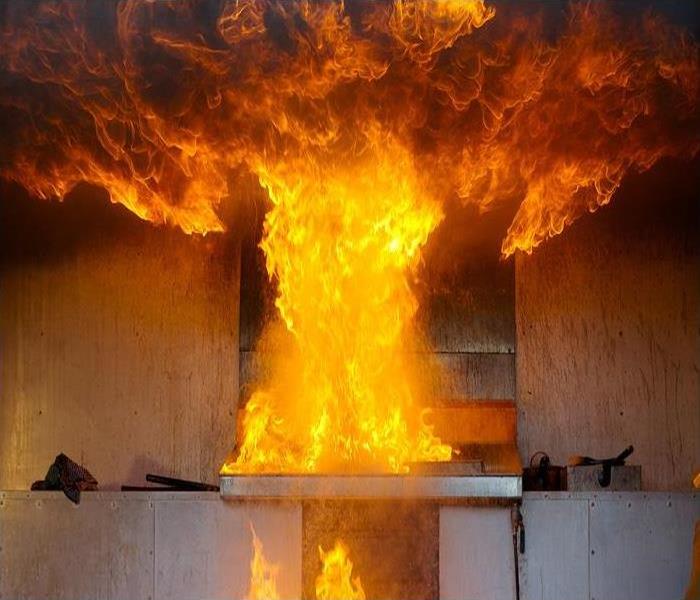 Fire Damage Restoration Fernandina Beach/Yulee North Jacksonville
Fire Damage Restoration Fernandina Beach/Yulee North Jacksonville
Fernandina Beach - Yulee - North Jacksonville - Kitchen Fire Prevention
Fire damage in Fernandina Beach often occurs in the kitchen. According to the most current research by the NFPA, 2 out of every five home fires start in the kitchen. Kitchen fires are also the leading causes of home-fire-related injuries. Prevent kitchen fires with the following safety tips:
Watch What You Are Cooking
Unattended cooking is the primary cause of cooking fires. Mitigate fire risks by:
- Always remaining in the kitchen when you grill, broil, or fry
- If you exit the kitchen, even for a second or two, turn off the heat source
- Using a timer when cooking
- Checking food regularly to make sure it doesn’t overcook
Be In The Right Condition To Cook
According to the National Fire Protection Association (NFPA), kitchen fires can happen when you are inattentive and impaired. Therefore:
- Avoid using your stove if you are sleepy
Remove All Cooking Surfaces
Keep flammable items such as paper towels, potholders and wooden spoons clear of the stovetop. You should clean your oven often to remove any spills and food debris. Additionally, clean stovetops frequently to remove grease and oil.
Use Your Appliances Wisely
According to Consumer Reports, kitchen appliances were the cause of over $547 million in fire damages in 2006-2008. Safeguard your home by doing the following:
- Always read and adhere to manufacturer’s instructions/safety warnings for all appliances
- Immediately register all new appliances to receive recall information
- Always act on product recalls
- Review product safety complaints about appliances in the kitchen to evaluate potential hazards
- Store small appliances unplugged
- Inspect all the power cords you use on appliances -- replace them if frayed
- Avoid using extension cords. Directly plug appliances into outlets
Maintain Personal Safety
According to estimations by the University Of Rochester Medical Center, maintaining personal safety helps prevent injuries to both yourself and others from kitchen fires. Do the following:
- Keep pets and children from cooking surfaces
- Tuck in long shirts before cooking
- Roll up your sleeves to prevent them from being close to cooking surfaces
- Secure long hair
Take the above precautions and prevent fire damage in your Fernandina Beach or Yulee kitchen. A safer kitchen protects your family and home.
If you experience a fire damage emergency, feel free to call SERVPRO of Fernandina Beach/Yulee (904) 729-2401. They are trusted and prominent leaders in the restoration industry. These fire damage professionals work round the clock to attend to any emergency. Whether you have cleaning or restoration needs, talk to them today.
Holiday Fire Prevention
12/16/2016 (Permalink)
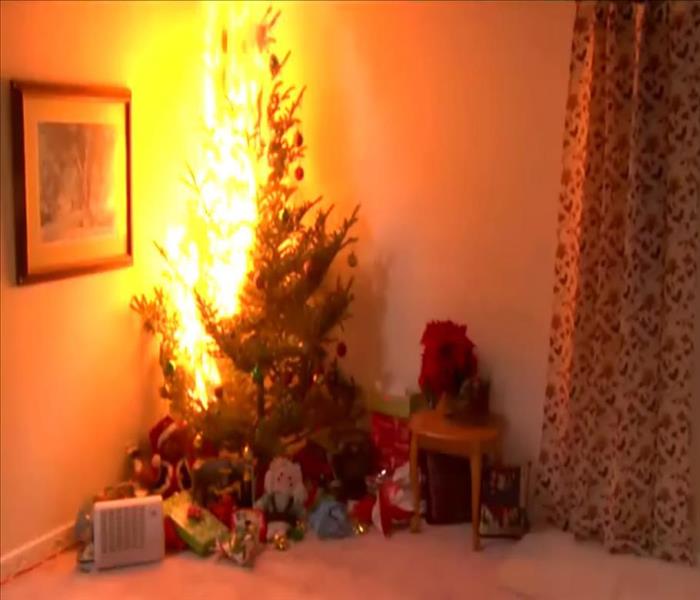 Holidays are meant to be spent with friends and family, not cleaning up fires. Make sure you know how to prevent holiday fires with a few simple tips.
Holidays are meant to be spent with friends and family, not cleaning up fires. Make sure you know how to prevent holiday fires with a few simple tips.
Did you know that one in every three home Christmas tree fires is caused by electrical problems? Although Christmas tree fires are not common, when they do occur, they are more likely to be serious. The U.S. Fire Administration (USFA) reports more than double the number of open-flame fires on Christmas Day than on an average day, and about twice as many on New Year’s Day. And when those fires occur, they do more damage: Property loss during a holiday fire is 34% greater than in an average fire, and the number of fatalities per thousand fires is nearly 70% higher. When the source of the fire is a highly flammable Christmas tree, the toll in property and lives is even greater.
To keep your household from becoming a holiday fire statistic, here are some safety tips to follow.
- Maintain your lights – by inspecting them for frayed wires, bare spots, gaps in the insulation, broken or cracked sockets, and excessive kinking or wear.
- Only use lights listed by an approved tested laboratory.
- Do not overload electrical outlets.
- Do not link more than three light strands, unless the directions indicate it is safe.
- Connect strings of lights to an extension cord before plugging the cord into the outlet.
- Make sure to periodically check the wires, they should not be warm to the touch.
- Do not leave lights on unattended
For more information and tips on preventing fires as well as what to do following a fire please visit SERVPRO Fire Damage Emergency Tips.
What to Do Following a House Fire
5/9/2016 (Permalink)
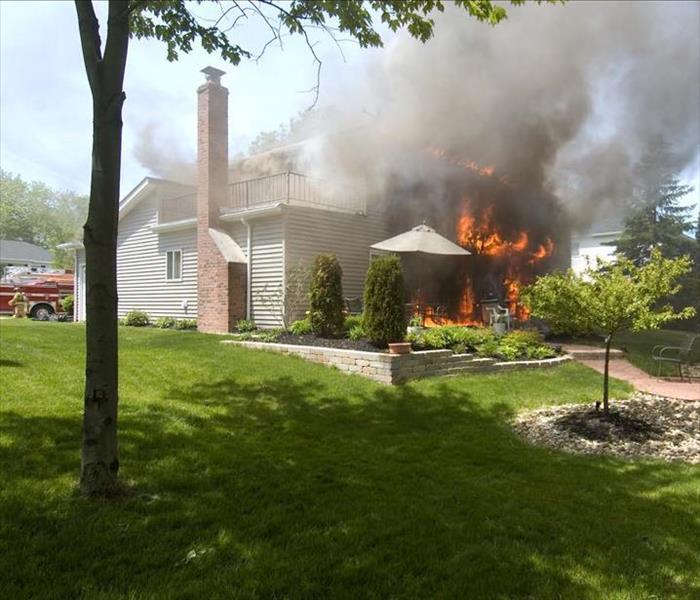 House Fire
House Fire
House fires are a disaster that no one wants to experience. Here are some steps to help limit further damage to your home after a fire.
- Ask when it is safe to enter a house or building after a fire. Do not enter a house or other building that has been affected by a fire until you have listened to the professionals telling you that it is okay to do so.
- Know who to contact after a fire. Contact family members that may not have been with you and let them know what happened as well as that you're okay. Contact a professional fire restoration expert such as SERVPRO to assist with the cleanup and restoration of fire damage.
- Secure the property. If you have not already done so it is important to secure your property to prevent possible looting. Talk to emergency services on how to best go about this.
- Consider the clean-up requirements. If your house has been damaged rather than destroyed, interior clean up will be required. Keep in mind that damage to the property often goes beyond what the eye can see. (Removal of a destroyed house should only be done by professionals.) Call SERVPRO to assess the damage.
- If water hoses were used to put out your fire, drying your home is VERY important. It is best to hire professionals to do fire/ water damage restoration and clean-up. Water damage can lead to more damage or even mold if not dried properly.
USDA Workplace Fire Prevention Tips
10/19/2015 (Permalink)
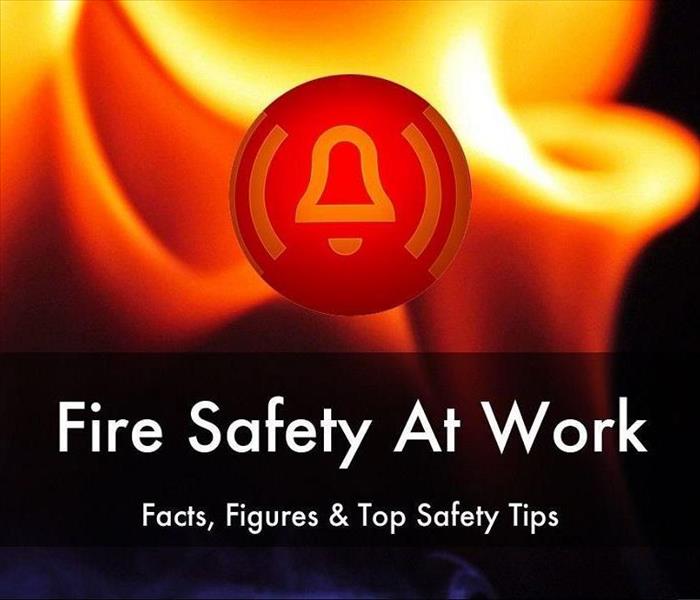 Fernandina Beach - Yulee - Jacksonville - Workplace Fire Safety Tips
Fernandina Beach - Yulee - Jacksonville - Workplace Fire Safety Tips
Workplace Fire Prevention Tips
The United States Department of Agriculture (USDA) Suggests:
Eliminate Fire Hazards:
Keep workspaces free of waste paper and other combustibles, have damaged electrical cords replaced and do not over load circuits.
Prepare for Emergencies:
Make sure you know who to call in an emergency; participate in all drills.
Report Fires and Emergencies Promptly:
Immediately report all foul odors or defective equipment to the Building Manager or Security. If fire is detected pull the fire alarm station to sound the alarm.
Evacuate Safely:
Leave the area quickly in an emergency; use stairs instead of the elevator. Assist your coworkers.
Do Not Use Open Flames:
The use of open flames in the work place is prohibited unless authorized.
General Workplace Fire Safety:
Make sure all walk ways and corridors are kept clear to ensure emergency egress is uninhibited. Use and maintain wiring, tools and equipment correctly. Keep everything oil and dust free. Uncoil an extension cord fully before use and use extension cords for temporary wiring ONLY; be sure the amperage of the cord is appropriate for the job you are doing. Do not use equipment that delivers mild electric shock, gives off unusual heat or smells odd. If in doubt have it checked and repaired or replaced. Sweep up scraps of paper or material and dust as soon as possible. Do not use electrical equipment when flammable gases, vapors, liquids, dust, or fibers are present. Ensure trash is emptied frequently enough to prohibit a buildup of combustibles in an area.
For More Information:
You can visit the links below for more information:
USDA United States Department of Agriculture
Fire Damage Repair and Restoration
Fire Damage Safety Tips
SERVPRO Fire Brochure
Fire Damage Restoration Process
Odor Removal and Deodorization
SERVPRO - Contact Us
Fire Prevention Month is Here
10/15/2015 (Permalink)
October is Fire Prevention Month
Did you know that if a fire starts in your home, you may have just minutes to escape?
The most effective way to protect yourself and your home from fire is to identify and remove fire hazards. 60% of house fire deaths occur in homes with no working smoke alarms. During a home fire, working smoke alarms and a fire escape plan that has been practiced regularly can save lives.
Preparing and Preventing a Home Fire - Steps You Can Take Now
- Keep items that can catch on fire at least three feet away from anything that gets hot, such as space heaters.
- Never smoke in bed.
- Talk to your children regularly about the dangers of fire, matches and lighters and keep them out of reach.
- Turn portable heaters off when you leave the room or go to sleep.
Smoke Alarms
- Install smoke alarms on every level of your home, inside bedrooms and outside sleeping areas.
- Teach your children what smoke alarms sound like and what to do when they hear one.
- Test smoke alarms once a month, if they’re not working, change the batteries.
- Smoke alarms should be replaced every 10 years. Never disable smoke or carbon monoxide alarms.
- Carbon monoxide alarms are not substitutes for smoke alarms. Know the difference between the sound of smoke alarms and carbon monoxide alarms.
Fire Escape Planning
- Ensure that all household members know two ways to escape from every room of your home.
- Make sure everyone knows where to meet outside in case of fire.
- Practice escaping from your home at least twice a year and at different times of the day. Practice waking up to smoke alarms, low crawling and meeting outside. Make sure everyone knows how to call 9-1-1.
- Teach household members to STOP, DROP and ROLL if their clothes should catch on fire.
- If a fire occurs in your home, GET OUT, STAY OUT and CALL for help.
- Install smoke alarms on every level of your home, inside bedrooms and outside sleeping areas.
- Test smoke alarms once a month, if they’re not working, change the batteries.
- Talk with all household members about a fire escape plan and practice the plan twice a year.
Jacksonville/Fernandina Beach Fire Damage
6/1/2015 (Permalink)
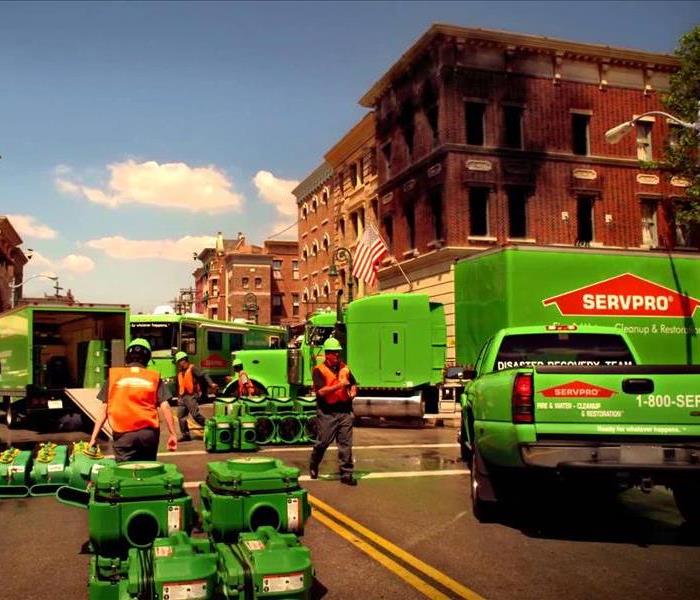 When you experience a fire, there is not only fire damage, but may also be water damage and mold damage.
When you experience a fire, there is not only fire damage, but may also be water damage and mold damage.
Important Fire Damage Restoration Tips
After a property has sustained fire damage in Fernandina Beach or Jacksonville, many homeowners are taken aback by the number of challenges that they must overcome while attempting to ensure the restoration and safety of their homes. In addition to being deadly, fires also have the capacity to cause a tremendous amount of property loss. Residential and commercial property owners must collect as much information as they possibly can before having to deal with one of these events. This will increase their chances of making rapid recoveries. The guide that follows is interactive and offers a number of helpful fire restoration tips along with tips that have been provided by FEMA.
The foremost priority of property owners is to assess the nature and amount of damages that a fire has caused. A number of items within the structure could be overlooked when attempting to gauge the full measure of damages. It is vital to carefully review the following items with a fire inspector before choosing to use these in the home or in the business:
· Edible goods
· Eating utensils and dishes
· Furnishings
· Clothing
· Carpeting
· Flooring
When damages are assessed, people often fail to consider their dishes, food and eating utensils. Eating foods that have been contaminated or using contaminated dishes and eating utensils can result in serious illness. A fire restoration service must properly inspect these items before use. If they cannot be salvaged or restored, they will need to be thrown out.
Although the flames will have caused much of the visible damage that occurs in your home during a fire, soot and smoke are often far less conspicuous hazards that could be very detrimental to human health. The leading cause of death among fire victims is smoke inhalation. Thus, smoke damage is the most important thing to consider when assessing fire damage.
Soot is unlike smoke in that it is very easy to detect. This is a fine coat of black dust that is produced by burning oil-based, coal or wood items. These carbon particulates circulate throughout the indoor space and can settle on any surface. If you inhale soot, it can cause serious lung ailments and even death. When the office or home is filled with soot contaminants, fire restoration specialists will have to assess the affected areas in order to learn whether or not it will be possible to restore them.
Water is often the last thing that people think about when dealing with fire damage. Another important detail that is frequently overlooked after a life-threatening blaze is the resulting water damage that results from the efforts on the part of fire officials to put the fire out.
Fires of all sizes are usually extinguished with water. Once fires have been contained, all affected areas will need to be dried completely in order to prevent additional property loss and damage. Restoration companies can employ industrial air movers and dehumidifiers in order to dry carpet padding, carpets, furniture and any other items that have been saturated with water.
Due to the fact that mold spores can develop within just 48 hours after water damages have occurred, it is vital to quickly and efficiently dry the affected area. Water, fire and mold together can result in total property loss if a trusted mold remediation specialist does not properly tend to these situations.
Homeowners can expedite their restoration and repair efforts by learning more about fire damage long before experiencing fires in their homes.
SERVPRO of Fernandina Beach/Yulee is locally owned and operated and serves Fernandina Beach, Yulee, Callahan, Hilliard, Oceanway, North Jacksonville, and the surrounding communities. Water comes from everywhere and our certified technicians can clean and dry any flood. Other services we provide include the following:
· 24/7 Fire Damage Restoration Service
· 24/7 Flood Damage & Water Damage Service
· 24/7 Sewage Damage & Sewage Removal Service
· 24/7 Mold Remediation
· 24/7 Bio-hazard Suicide Clean
· 24/7 Commercial Cleaning
October is Fire Prevention Month!
8/27/2014 (Permalink)
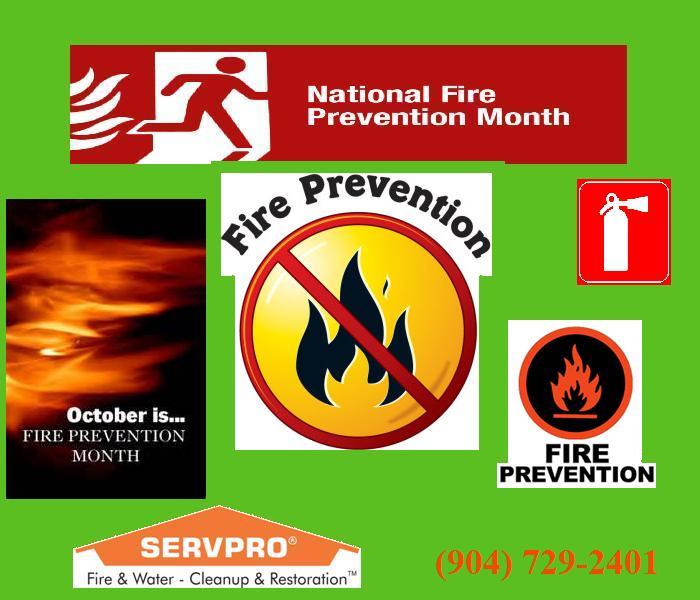 October is Fire Prevention Month! Join us at the Yulee Home Depot on October 4th and spread the word of fire prevention!
October is Fire Prevention Month! Join us at the Yulee Home Depot on October 4th and spread the word of fire prevention!
Is your family prepared for a fire emergency? October is National Fire Prevention Month and it serves as an excellent time to examine your preparedness. Do you have a home fire escape plan? Have you changed smoke-alarm batteries within the last year? Do you know the main reasons for fires starting in the home?
The U.S Fire Administration reports that fires kill more than 4,000 Americans each year and approximately injure 20,000 more. U.S. fire departments respond to nearly 2 million fires each year, with three-quarters of them occurring in residences.
A home is often referred to as a safe haven. During October, make sure your home is protected from (and your family is prepared for) a fire. Here are 10 simple tips to help you avoid fires and reduce the risk of injury should one occur:
1. Smoke Alarms – These are still a very important addition to your home. Smoke alarms are widely available and inexpensive. Install a smoke alarm on every level of your home and test it monthly.
2. Prevent Electrical Fires –Don’t overload circuits or extension cords. Cords and wires should never be placed under rugs or in high traffic areas. Avoid loose electrical connections by checking the fit of the plug in the wall outlet. If the plug loosely fits, inspect the outlet right away. A poor connection between the plug and the outlet can cause overheating and can start a fire in minutes.
3. Keep Plugs Safe – Unplug all appliances when not in use. Follow the manufacturer’s safety precautions and use your senses to spot any potential disasters. If a plug is overheating, smells strange, shorts out or sparks – the appliance should be shut off immediately, then replaced or repaired.
4. Alternate Heaters – Make sure there is ample space around any portable heating unit. Anything that could catch fire should be at least three feet away. Inspect your chimney annually and use fire screens to help keep any fires in the fireplace.
5. Fire Safety Sprinklers – When combined with working smoke alarms, home fire sprinklers greatly increase your chance of surviving a fire. Sprinklers are affordable and they can increase property value and lower insurance rates.
6. Create An Escape Route – Create and practice your escape plan with your family from every room in the house. Practice staying low to the floor and checking for hot doors using the back of your hand. It’s just like a routine school fire drill – but in your home.
7. Position Appliances Carefully – Try to keep TV sets, kitchen and other appliances away from windows with curtains. If there is a wiring problem, curtains can spread a fire quickly. Additionally, keeping your appliances away from water sources (like rain coming in from windows) can help prevent wiring damage, which can lead to a fire.
8. Clean Dryer Vents – Clothes dryers often start fires in residential areas. Clean the lint filter every time you start a load of clothes to dry or after the drying cycle is complete. Make sure your exhaust duct is made of metal tubing and not plastic or foil. Clean the exhaust duct with a good quality dryer vent brush to prevent blockage & check for lint build up behind the dryer at least twice a year.
9. Be Careful Around the Holidays – If you fill your home with lights during the holiday season, keep them away from anything that can easily catch fire. Check all of your lights prior to stringing them up and dispose of anything with frayed or exposed wires.
10. Conduct Regular Inspections – Check all of your electronic equipment and wiring at least once a month. Taking a little time to do this each month can really pay off.
Following these simple tips could potentially save your life or the life of a loved one. Pass this list on to your friends and family and make this fire prevention month count!
We will be at the Home Depot in Yulee October 4th from 9:00 a.m. -- 3:00 p.m. along with our local fire rescue team spreading the word of Fire Prevention and Safety.
Fire Damage Safety Tips & Prevention
6/2/2014 (Permalink)
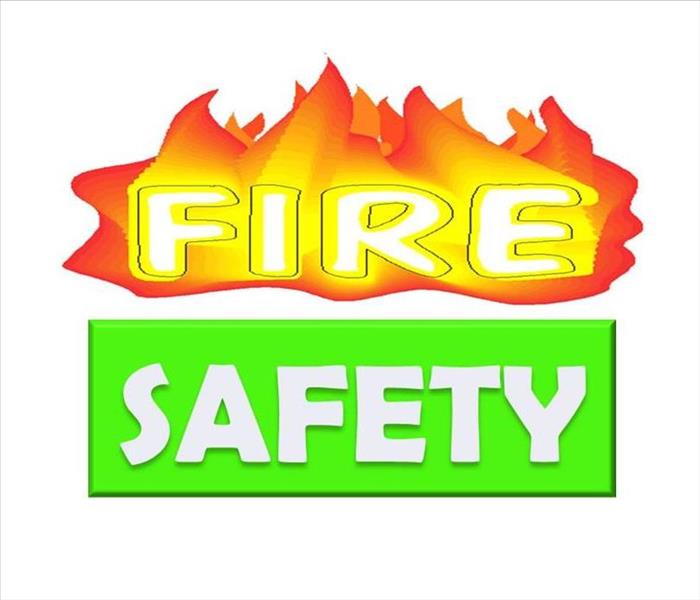 Following these fire safety tips can greatly reduce the risk of fire damage in your home or office.
Following these fire safety tips can greatly reduce the risk of fire damage in your home or office.
Fire Saftey Tips and Prevention
Electricity
Electrical distribution equipment poses serious fire safety threats that can even be fatal, especially when equipment is used incorrectly.
Electrical Safety Basics
Protect electrical outlets with plastic safety covers if small children are present in your homeNever operate electrical appliances around bathtubs, showers, or puddles of standing waterUse ground fault circuit interrupter (GFCI) protection when working where water is near electricity, to protect against electric shock … This means you should use GFCIs in your kitchen, laundry room, bathroom, and outdoor locationsReplace or repair frayed, loose, or otherwise damaged cords on all electronicsShut off the circuit and have it checked by an electrician if any switches feel warmTake note of any discolored switch plates, because discoloration could indicate that the electrical wiring behind the switch plate is overheatingRemember: symptoms of potential wiring problems include household lights that dim or flicker, a TV picture that shrinks in size, frequent blown fuses, or circuit breakers that trip frequentlyPlace lamps on level surfaces, away from flammable items, and use light bulbs that match the lamps’ recommended wattagesExtension Cords and Surge Suppressers
Never use an extension cord as a replacement for permanent wiringAvoid running extension cords across doorways or under carpetsMake sure power strips and surge suppressors are designed to handle the loads you will be using them forConnect power strips and surge protectors directly into a wall outlet. Do not connect multiple power strips or surge protectors togetherAvoid overloading circuits by plugging too many items into the same outletAvoid the use of "cube taps" and other devices that allow the connection of multiple appliances into a single receptacle, and try to only plug one high-wattage item into each outletHalogen Lighting
Avoid using halogen lamps whenever possible since they operate at much higher temperatures than normal light bulbsIf you use halogen lamps, make sure the lamp is placed in a location where it cannot come into contact with drapes, clothing, or other combustible materialsKeep halogen lamps and cords away from high-traffic areas and turn lamps off when leaving the room for an extended period of time Heating Safety
Heating equipment is the leading cause of home fires during the winter months, and the second leading cause of home fires annually. Heating equipment includes fireplaces, wood stoves, portable space heaters, and fixed space heaters. Nearly half of all deaths attributed to home heating equipment fires involve portable space heaters.
Heating Basics
Have all heating equipment in your home inspected annually by a licensed professionalMake sure all gas-fueled and wood-burning heating devices are vented to the exterior of the buildingConsider installing a carbon monoxide alarm in a central location outside of each bedroom if gas-fueled or wood-burning appliances are used in your homeFireplaces and Wood-burning Stoves
Have wood-burning stoves, fireplaces and chimneys inspected and cleaned on a periodic basisUse properly seasoned wood to reduce creosote build-up in fireplaces and stovesProtect fireplaces with a sturdy screen to prevent sparks from flying into the roomAllow ashes to cool before removing them from a fireplace or stoveDispose of ashes in a metal containerSpace Heaters
Maintain a 36 inch clearance between space heaters and combustible itemsTurn off portable space heaters every time you leave the room or go to sleepLaundry
Laundry equipment is often overlooked when addressing the issue of home fire safety. However, laundry appliances pose a serious fire risk because they involve electricity, and the combination of combustible clothing and extremely hot temperatures. The vast majority of laundry fires are caused by dryers that are not cleaned properly.
Dryer Safety Basics
Have dryers installed and serviced by a competent professionalHave gas-powered washers and dryers inspected periodically by a professional to ensure the gas line and its connection are intactMake sure that the dryer is plugged into an outlet that meets its electrical needs, so it doesn’t overload the outlet and trip circuit breakers or blow fusesKeep the area around the dryer clear of boxes, clothing, and other combustiblesTurn the dryer off when leaving homeLint Filters
Do not operate the dryer without a lint filterClean lint filters before or after each use, and remove any lint from around the dryer drumMake sure the dryer exhausts into the exterior or into a listed water trapInspect the area around the dryer for accumulations of lint, paying special attention to the area behind the dryer, and remove any lint you noticeInspect the flexible exhaust duct (if your dryer has one), and remove lint accumulations on a periodic basisGasoline
Each year gasoline causes several thousand household fires, many of which result in injury and even death. It is helpful to remember gasoline is a volatile liquid that is constantly releasing flammable vapors, which are heavier than air and accumulate at the lowest point in an area. If released inside a building, these vapors sink to floor level and spread out across the room, and if these vapors make contact with an ignition source a flash-fire will likely result.
Gasoline Safety Basics
Keep gasoline out of children's reach and sight, and never allow children to handle gasNever use gasoline inside the home or as a cleaning agentNever use gasoline to start a fire in barbecue pits or cooking grillsNever use gasoline as a replacement for kerosene or dieselDo not use or store gasoline near potential ignition sources, including gas-fired water heaters that contain a pilot flameFollow all manufacturers’ instructions when using electronics (including all devices with batteries or connections to electrical outlets) near gasolineClean up spills immediately and discard clean-up materials properlyIn the Event of Gasoline Fire
Leave the area immediately, and call the fire departmentDo not attempt to extinguish the fireDo not attempt to stop the flow of gasolineGasoline Storage
Store gasoline outside in a garage or shedNever store gasoline in glass, or in plastic milk jugs and other non-reusable plastic containersStore gasoline in a tightly closed metal or plastic container designed, manufactured, and approved specifically for gasoline storageStore only the amount of gasoline necessary to power equipment and machineryFueling and Handling Gasoline
Do not smoke while handling gasolineUse caution when fueling machinery and automobile equipmentNever fuel machinery or equipment indoors, and always let it cool before refuelingPlace portable gasoline containers on the ground before filling, and only fill them outdoorsNever fill portable containers inside a vehicle or in the bed of a pick-up truck, to prevent a static charge from developingDo not get in and out of automobiles while fueling … Although rare, this movement creates an electrical charge on your body that could spark a fire, especially during dry weather conditionsPropane
Over 1,000 home fires are caused by liquid propane annually, and these fires cause hundreds of injuries and deaths. Propane is a flammable gas that is converted to a liquid before being stored within a cylinder or tank. When released from its container, propane converts back to a gas and expands significantly; if this expanding gas comes in contact with an ignition source an explosion can result. When first released, the gas is cold and heavier than the surrounding air, which creates a “cloud” of heavy gas that will stay close to the ground and collect in low areas.
Propane Safety Basics
Never store or use propane gas cylinders larger than one pound inside your homeNever store or operate a propane-powered gas grill indoorsAlways handle propane-powered equipment cautiously, according to the manufacturers’ instructionsHave propane gas equipment inspected by a professional for leaks and faulty parts on a regular basisFollow the manufacturers’ instructions carefully when lighting pilotsLeave the area immediately and call the fire department from outside the home if you smell a strong odor of gas






 24/7 Emergency Service
24/7 Emergency Service


















































